The Future of Irish Families Lecture Recordings
Ella Sexton speaks to the National Women’s Council about the March referendum in features, page 11 »
László Molnárfi says that students and staff must unite in calling for lecture recordings in opinion, page 18 »

Matthew Keeley asks whether the lack of Irish actresses in the zeitgeist is concerning or coincidental.
The University Times
National Demonstration, starting at the Garden of Remembrance in Parnell Square at 1pm on Saturday. The event began with a speech from Sanders, wherein the Senator expressed his desire to see better relationships between the United States and Ireland. Sanders spoke of the “joys and sorrows of being a
The Hist Debate the New Name of the Berkeley (X)
The Hist held a debate on the renaming of The X Library, formerly known as the Berkeley Library, with ten speakers each arguing for their own proposed name. The debate featured five students, Ben Kieran Glennon, Malika Maniar, Brian Lennon, Clare Tobin and Méabh Scahill. The students were joined by five additional guests: Micheline Sheehy Skeffington, Professor James Smyth, Mary McAuliffe, Brian Lennon and Reverend Gordon Linney. The renaming of The X Library comes after
favor of the name Oscar Wilde, after the prolific Irish poet and playwright, and former Trinity student. Lennon, a third-year Classics student and Scholar, encouraged the audience
CONTINUED ON PAGE 3 »

United States Senator”, a job which, in his view, has “increasingly more sorrows than joys”.
Sanders further expressed his desire to shed light on the structural issues facing the United States and the world, stressing that “the more important an issue is, the less it is discussed”. He stated that the United States and the global economy are moving rapidly towards an oligarchic form of society: “Today on this planet, the top 1 per cent own more wealth than the bottom 90 per cent”. This means that the working class is falling further behind as the growth of oligarchy accelerates.
Sanders also noted that “the sta-
edented opportunity to make life a lot better for ordinary people”. The challenge rests in the question of
Sanders had to cancel a number tional security bill in the Senate, which allocates around $14 billion in military aid to Israel. Although the bill passed by 70 votes to 29, Sanders acknowledged that it was “not an easy vote”. While the bill provided support to Ukraine and provisions for humanitarian aid,
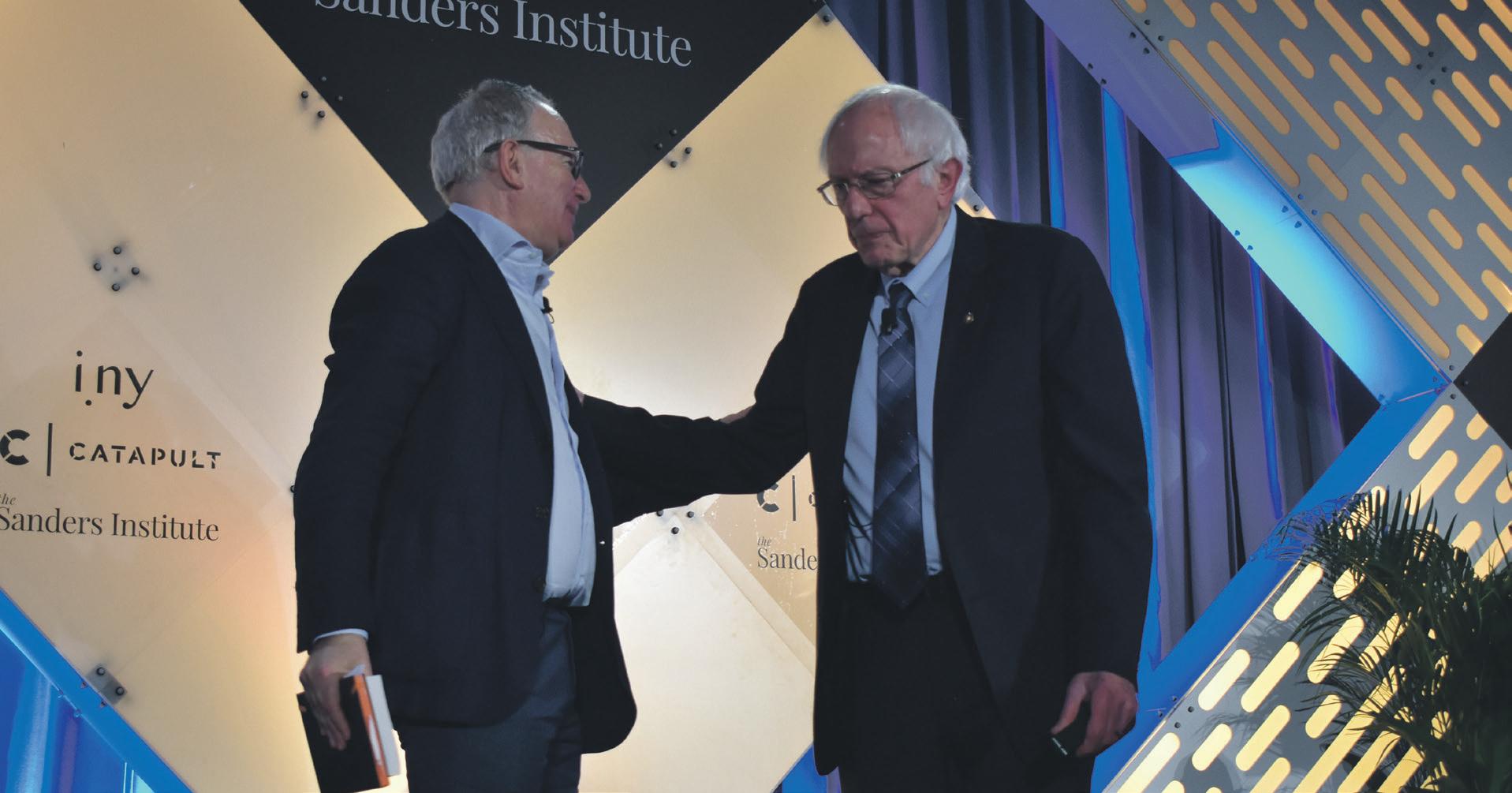
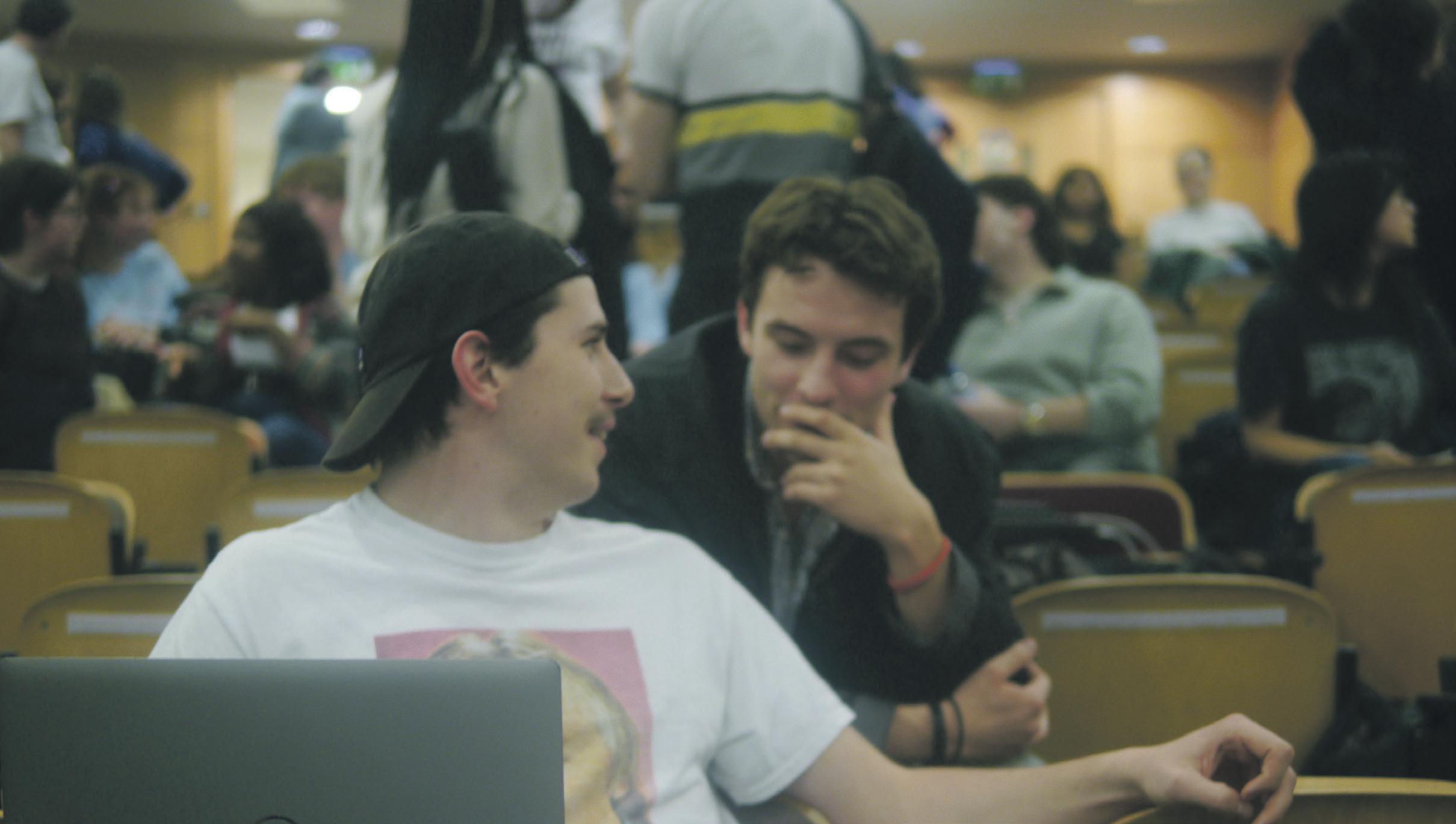
However,
Volume XV, Issue V universitytimes.ie Monday 26 February, 2024 PHOTO BY BRIDGET MCBRUISER FOR THE UNIVERSITY TIMES Your one-stop guide to the Trinity College Dublin Students’ Union (TCDSU) sabbatical elections, featuring comprehensive analysis of our poll results and in-depth interviews with each candidate. For the definitive resource for informed decision-making, read our Election Supplement, inside » TCDSU Sabbatical Elections: Candidates Diverge on their Policies, Promises and Personal Motivations
Discussion
in the
Sáoirse Goes DEPUTY EDITOR United States Senator Bernie Sanders sat down with Irish Times journalist Fintan O’Toole on Friday evening to discuss the personal aspects of his political life, his journey from Vermont to Washington, and the vision underpinning his work. A partnership with the Ireland.New York Project (I.NY), Catapult and the Sanders Institute, the event was held in the Exam Hall in Trinity College in anticipation of the release of Sanders’ new book, entitled It’s OK to be Angry About Capitalism As a long queue of guests formed through and beyond Front Square on Friday evening, protestors gathered outside the Exam Hall asking those attending the event to question the Senator about the current situation in Gaza. Protesters’ chants included “Bernie Sanders
hide, you’re denying genocide”, and urged those queueing to attend the
Protesters Disrupt Senator Bernie Sanders’
of the Personal
Political
you can’t
BY ADAM RAINBOLT FOR THE COLLEGE HISTORICAL SOCIETY CONTINUED
Concerns Raised Over Government Green Paper on Disability Reform At the fifth Trinity College Dublin Students’ Union (TCDSU) council of the year on Tuesday, February 6th, a motion to oppose the government’s Green Paper on Disability Reform shone a spotlight on the potential repercussions of the proposed reforms. TCDSU is one of 20 groups to have joined the ‘Scrap the Green Paper’ coalition, which calls upon the Department of Social Protection to reconsider the reforms in light of the scrutiny they have received. The goal of the Green Paper, a document designed to encourage public consultation on the restructuring of long-term disability payments, is ostensibly to “encourage a higher level of employment for people with disabilities”, and “to better insulate disabled people who cannot work from poverty and deprivation”. The proposed reforms would remodel the structure of disability payments to establish a three-tiered system to assess eligibility for disability payments, and to standardise the approach to supporting people
disabilities “with regard
access, assessment, payment
employment
PHOTO
ON PAGE 2 »
with
to
rates and
supports”.
posed
described the planned categorisation of disabled people into
tiers as
CONTINUED ON PAGE 2 » Clara Roche EDITOR
critics of the pro-
reforms have
different
“dehumanising”, and
Trinity’s Board decided in April of 2023 to dename the Eliora Abramson SOCIETIES EDITOR library as its namesake George Berkeley held a sordid history of slave-ownership. The Trinity Legacies
will be advising
on a new name
the library. This debate came with a disclaimer that the new name would not be decided that night, but the debate was instead
forum
public opinion to be voiced preceding the official renaming. Alternating between students
guest
began
in
Review Working Group
Trinity’s Provost
for
a
for
and
speakers, Brian Lennon
the debate
Editor: Clara Roche Volume XV, Issue V ISSN: 2013-261X Phone: (01) 646 8431 Email: info@universitytimes.ie Website: universitytimes.ie This newspaper is produced with the financial support of Trinity College Students’ Union, but maintains a mutually agreed policy of editorial independence. To contact UT, write to: The Editor, The University Times, 6 Trinity College Dublin 2 NEWS B2 SPORT B16 FILM & TV R15 FEATURES B11 ART R2 LITERATURE R3 OPINION B12 FASHION R4 MUSIC R5 EDITORIAL B12 FOOD R6 THEATRE R9
Fable Fever Ella Parry spoke to Elyse Clarke and Kate O’Sullivan about the friendship that took them from a cookery course to founding Fable Bakery IN FOCUS OPINION
Magazine
Protesters Disrupt Senator Bernie Sanders’ Discussion of the Personal in the Political
In a conversation with Fintan O’Toole in the Exam Hall on Friday, February 16th, the Senator discussed his career and the polarisation in global politics.
tus quo is working phenomenally well for the people on top”. Crediting this increasingly apparent disparity to the growth of right-wing extremism, Sanders lamented this “distrust in democracy”.
Speaking to the growing urgency of climate change, the Senator mentioned that his home state of Vermont experienced its “worst natural disaster in a hundred years”, with devastating flooding. Sanders noted that “the challenge is that America and Ireland alone cannot solve the climate crisis, every country in the world is going to have to transform their energy system”. Sanders also touched on the growth of artificial intelligence which, in his view, “gives an unprecedented opportunity to make life a lot better for ordinary people”. The challenge rests in the question of who will benefit from this explosion of technology.
provisions for humanitarian aid, Sanders explicitly opposed the direct funding of Netanyahu’s government. Having only recently started touching on the Holocaust and his family connections to it, O’Toole asked: “How much was that a shadow over your own consciousness?”
Sanders told the journalist that “it made me do my best to fight against all forms of racism and bigotry that exist”. He continued, noting that “it pains me very much to see demagogues like Trump try and divide people up”.
in the Vietnam War, a “devastating war” for his generation, as he draws connections to the current political climate. He asserts, “This so-called bipartisan policy has been wrong and wrong”, citing American involvement in Iraq, Afghanistan and Chile, and criticising the country’s $900 billion military budget.
“I will do my best to defeat Trump, understanding that Biden has not by any means done what I want him to do.”
Sanders had to cancel a number of events to vote against a US national security bill in the Senate, which allocates around $14 billion in military aid to Israel. Although the bill passed by 70 votes to 29, Sanders acknowledged that it was “not an easy vote”. While the bill provided support to Ukraine and
Sanders also credits his working-class upbringing for providing him with an understanding of the effect of money and a lack of money on your life. He explained that “life expectancy is declining in the US right now”, with the rise of “diseases of despair”, notably drugs, alcoholism and suicide, while medical costs are a major factor in bankruptcy rates. Sanders tells O’Toole about his involvement in the civil rights movement and the anti-war movement
As the protestors’ sirens and chants gradually make their way into the hall, O’Toole asks about the Senator’s lack of interest in “protest for protest’s sake”. Sanders explains that “politics is more complicated than protesting, change never takes place without years of struggle”. Sanders fundamentally maintains that the “political system is corrupt in the US”, adding that “it takes a huge amount of money to get elected”. It is from this basis that he defines himself as “proudly independent”, while being the longest-serving independent in American congressional history. In his analysis of the state of American politics, Sanders feels that both the Republicans and the Democrats have been corrupted by “big money”, albeit from different sources. The House of Representatives is “dysfunctional”, in his view, whilst the public “politically divided”.
O’Toole drove the conversation to the “trap of the two-party sys-
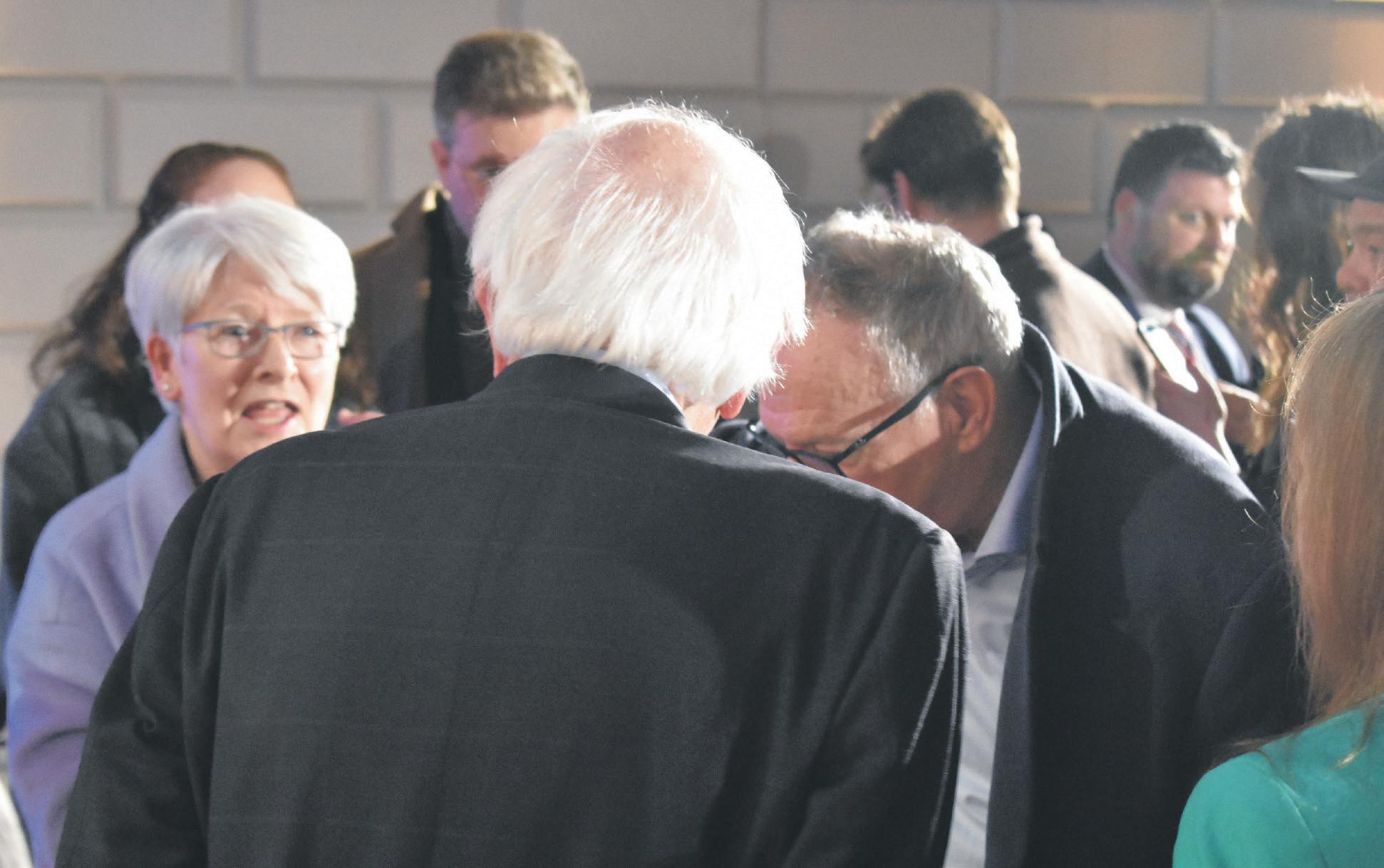
tem”, asking how the Senator morally navigated the choice of “critically support[ing] Biden”. Sanders acknowledged that “it’s a difficult path to walk down”, recalling his decision not to run in 2016: “I did not want to see Trump get elected by splitting the vote”. Despite having worked together on the American Rescue Plan during the pandemic, Sanders remains critical of President Biden. Sanders stressed that he is “working hard to change his [Biden’s] stance on Israel”. Looking towards the upcoming presidential election in November
PHOTO BY ADAM RAINBOLT FOR THE COLLEGE HISTORICAL SOCIETY
this year, Sanders pledges that “I will do my best to defeat Trump, understanding that Biden has not by any means done what I want him to do”. Nevertheless, the Senator stresses that, “Trump is not a typical candidate, it is a debate over whether the US remains a functioning democracy”. Following two audience questions, posed by O’Toole, a protester stood and questioned why Sanders would not call for a ceasefire in Palestine. The woman then strode through the central aisle further questioning the Senator, prompting O’Toole to call
on her to calm down, saying “let him answer the question”. Although the Senator initially said “I’m not going to answer the question because I don’t like people disrupting me”, he continued, arguing that “I’ve led the effort in the Senate to try and end this war ... I’ve talked about my views on Gaza and I’ve done everything I can”. Sanders said that what is happening is “a horror”, saying that he has “nightmares every night”. He concluded: “My dream would be if tomorrow the President woke up to what the people actually want”.
Concerns Raised Over Green Paper on Disability Reform
Disability adovcacy groups have raised concerns about its categorisation system and lack of consultation with disabled individuals, amidst a broader coalition calling for its revision and extended public consultation.
« CONTINUED FROM PAGE 1
pointed to the existence of disabilities where one’s capacity to work fluctuates over time. The University Times spoke to voices from various quarters of the disability advocacy sphere to understand the implications of the Green Paper as the fate of these reforms hangs in the balance.
At the fifth council, which took the form of a town hall, Disabilities Officer Keely Jenkinson called the Green Paper “a carbon copy of the Tory policy” of work capability assessments introduced under austerity that led to an increase in disabled poverty and death. TCDSU President Lászlo Molnárfi, who proposed the motion to enshrine the Union’s opposition to the Green Paper, said that it sees “people with disabilities in an economic way”, and the motion further claimed that the Green Paper breached Article 33.3 of the United Nations Convention on the Rights of Persons with Disabilities in its failure to consult disabled individuals on the proposed reforms.
Amy O’Keeffe, the chair of Trinity’s Ability Co_op, a collaborative initiative between students and staff that works towards improving inclusivity on campus, told The University Times that “the potential impact of the suggested reforms give a general feeling of anxiety and fear to disabled people in the country,

whether they are receiving a payment or not”.
O’Keeffe highlighted the language used in the Green Paper as reinforcing an economic model of disability that focuses on increasing participation in the workforce rather than improving supports. She said that while the Co_op commended the idea of an initiative to alleviate disabled poverty and to provide support for disabled people who wish to pursue employment, the proposed reforms and the language used were “troubling and disappointing”. She corroborated the Union’s belief that the voices of disabled individuals must be central to any meaningful reform efforts, arguing that “the drafting of this paper would also suggest that no meaningful dialogue was engaged in with the disabled people who will be directly affected by these measures”. She said that the lack of direct engagement was in conflict with the European Commission’s Strategy for the Rights of Persons with Disabilities, which prioritises, among other things, autonomy and community inclusion.
The views of the Co_op were echoed by Elle Garvey, the Policy Officer for Disability Power Ireland (DPI). The grassroots organisation were part of the organising team behind the ‘Scrap the Green Paper’ coalition. Garvey said the Green Paper would not achieve either of
its proposed goals of reducing poverty or increasing employment for people with disabilities. She said that the Green Paper instead “puts the onus on disabled people to seek employment, rather than addressing actual barriers to employment, such as the accessibility of public transportation and buildings, assistive technology in the workplace, flexible working hours, providing disability education and training for businesses and expanding schemes and incentives for workplaces to hire and provide accessible resources for disabled employees”.
She too expressed concern at the lack of consultation with disabled
people or disability organisations at the development stage, stating: “The proposed changes are in direct opposition to the lived experience of disabled people and international and national evidence and best-practice guidelines”. She said that DPI were “extremely disappointed” by the government’s approach, calling the proposed Green Paper “a step backwards rather than forwards”. Public consultation on the Green Paper will close on March 15th. The deadline was extended by Heather Humphries, the Minister for Social Protection, due to the controversy surrounding the proposed reforms.
“The proposed changes are in direct oppoisition to the lived experiences of disabled people.”
PHOTO VIA THE UNION OF STUDENTS IN IRELAND (USI)
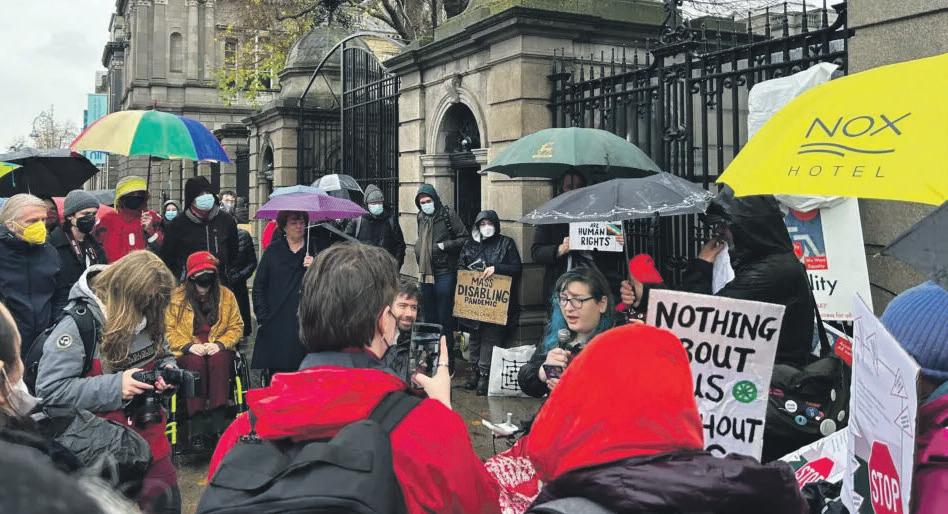
The University Times Monday 26 February, 2024 2 NEWS
« CONTINUED FROM PAGE 1
PHOTO VIA MCULLOUGH MULVIN ARCHITECTS
Students and Staff Suggest New Names for the Former Berkeley Library at Hist Debate
Ten students, staff members and special guests each argued for a new name for the Berkeley Library in the Exam Hall on Wednesday, February 7th.
gathered in the Exam Hall to “take a walk on the Wilde side”, describing Wilde’s time at Trinity College Dublin as both “formative” and “foreboding”. Lennon argued that Wilde was a champion of both youth and love and should be honoured as such.
Professor James Smyth then took to the stage to debate for the name Theobald Wolfe Tone. Tone, who was a leading figure in the Irish’s fight for independence from Britain, additionally founded the United Irishmen. Smyth argued that inclusivity includes both racial and gender identities as well that of religious inclusivity. He stated that though all the distinguished figures proposed tonight represented a tradition to be “acknowledged, cherished, and honored”, he was “pretty sure they would cast a vote” in favor of Tone. Tone was Auditor of the Hist in 1787 and also won all three of the Hist’s medals.
In a change of pace, Malika Maniar, senior sophister in History and Politics and current treasurer of the Hist, proposed the name 1904. 1904, Maniar explained, was the first year that women were allowed to study at Trinity. A school with now over 60 per cent of female students, Maniar argued that the former Berkely library is one of the most public and central places on campus and as such a hub, it is important to ask what we want to value and put forward when renaming it. Maniar spoke about former provost of Trinity, George Salmon, who famously said “over my dead body will women enter this college”, a man whose statue is a consistent figure in the graduation photos of many a female Trinity student. Maniar argued that though Salmon was one person, he was part of a wider idea and feeling and that here at Trinity, the conversation is about how far women have come against him
rather than celebrating the actual achievement. 1904, she argued, represents the first step forward to where we are today. As it’s impossible to honour all women, Maniar argued “by representing none, you represent them all”.
Architect Róisín Murphy then spoke in favour of the name Paul Koralek, the architect who designed the library. Murphy, an architect herself, spoke first of the importance of the association between buildings and power, particularly in relation to the British and their colonisation of Ireland. She then explained the story of Koralek, who was 28 when he built the library after winning a competition. This story, she said, was beloved by Irish architects, calling the building their “pet brutalist building”. Murphy argued that Koralek’s youth is “evident all over the building”, saying he put everything into it, with “bubbling youthful enthusiasm”. She praised his work as “unrestrained” in a youthful manner and argued that the design captures“excess ambition with no cynicism”. She ended her speech by stating that College choosing this name would represent them making investment and putting their faith into young people.
The name Saoirse, the Irish word for freedom, was then debated for by Ben Kieran Glennon, a first year student studying Law and Politics.
Kieran Glennon acknowledged the merits of the other speaker’s proposed names but argued that the idea of naming a building after a singular individual perpetuates the idea that history and change is made by singular people. He stated that it is ordinary people who together make change, this being especially true in academia. Continuing to acknowledge the achievements of the proposed individuals, Kieran Glennon argued that they all share one common thread – the search for freedom. He also made an argument that the name Saoirse
returns to the reason the library is being renamed in the first place. He stated that he was initially against the idea of renaming the library as he didn’t think Trinity should be able to hide from the fact it had honored a slave owner. Saoirse, however, acknowledges this, striking a balance between accountability and moving forward. He also expressed the importance of the name of the library being in Irish, saying that Gaelic has long been repressed and it’s time for a name that honours Irish history.
Micheline Sheehy Skeffington then proposed her father, Owen Sheehy Skeffington. Her father both studied and taught at Trinity and served as a Hist committee member and was a Irish senate member. He is praised as a champion of women and minority rights, civil liberties, and freedom of speech among others. Sheey Skeffington described her father as fearless for speaking out on what he believed to be the truth, with unwavering compassion for even his opponents. She argued that his lifetime of fighting injustice and advocating against force makes him an icon of independent thought and an example of the usage of debate to create change in society.
Final year History student and Editor of the Trinity Journal of Histories Clare Tobin then gave her speech in favor of naming the library after African Philosopher Anton Wilhelm Amo. Tobin explained that though Amo was not Irish and had no connection with Trinity, his story has everything to do with why we are renaming the library saying it is a great opportunity to demonstrate global outlook. As the only person of color proposed, Tobin argued, naming it after Amo honors the period of contemplation since denaming the library. Amo, who was only 18 years younger than Berkeley, believed in and defended human equality. Tobin argued that the fact Berkely and Amo were
contemporaries, highlights that right and wrong has not changed throughout history and that change and revision are welcomed additions to the story of history.
Jonathan Swift was then proposed by Reverend Gordon Linney. Linney began his speech by stating that he felt the renaming was synonymous with “driving a car only looking in the rearview mirror”. Linney had brought a prop with him, a pair of Calvin Klein underwear. He explained to a bemused audience that the underwear had been made in Bangladesh. This, he argued, proved that slavery was not a thing of the past, meaning that the premise of the debate about Berkeley is “false” and that the notion that slavery has been left behind is “ridiculous”. Despite this, Linney did have a proposal for the rename, honoring famed Irish author and satirist, Jonathan Swift. Linney described Swift as a “pain in the butt for the English establishment” and argued that Swift’s works of both letters and satire were instrumental in working to prevent the English from exploiting the Irish as well as exposing the exploitation of poor Catholic families. He also added that Swift’s commitment to mental health in the form of his donation to St Patrick’s Hospital deems him worthy of the honor of having more than just a lecture hall named after him. He ended his speech, however, by urging the audience to not “fall for temptations of believing slavery is gone and finished”.
The last student speaker, Méabh Scahill, a third year History and Art History student and Scholar, proposed the library be renamed in honor of Irish poet and author, Eavan Boland. Schaill argued that Boland had “carved out space for women ” in poetry and that her work makes her uniquely suited for the honour through its interactions with colonialism, racism, and misogyny, all of which is a “legacy we fail to engage with”. She argued
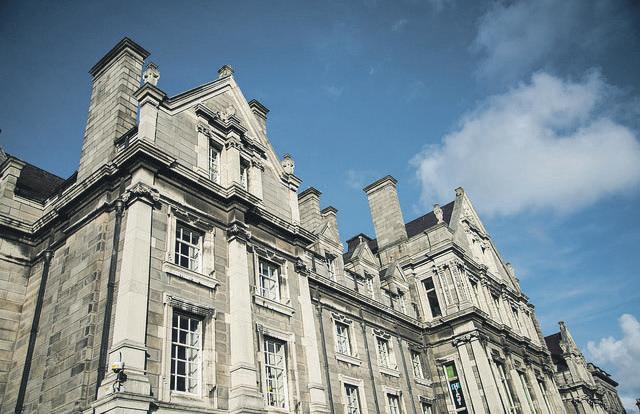
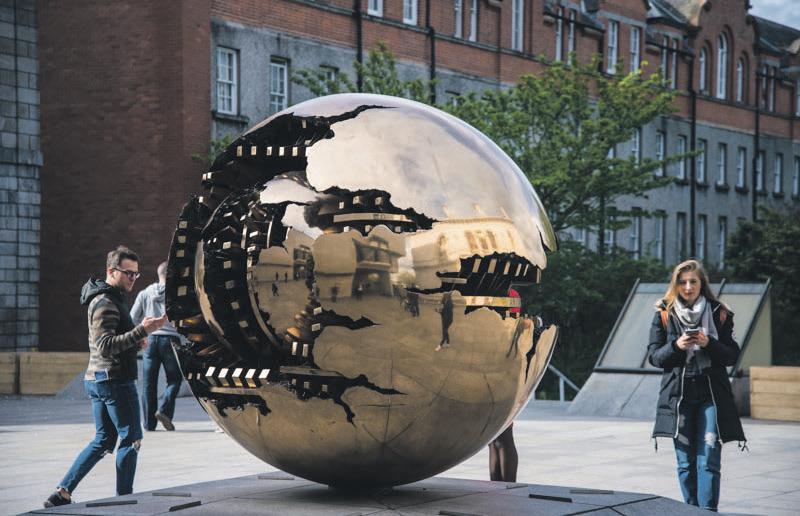
that this is an opportunity to celebrate Boland, highlighting her to staff, students, and visitors who may not have been exposed to her before. She finished by stating that in doing so, Trinity creates distance from Berkeley in a way that isn’t performative and is insead authentic and in agreement with the thesis of the Legacies Working Group.
To end the debate, UCD academic of History and Gender Studies, Mary McAuliffe then proposed the name Maxwell-OtwayRuthven, a slight modification of her originally proposed name of Maxwell. McAuliffe explained and argued for her choice, maintaining the academic achievements of both Constantia Maxwell and
Annette Jocelyn Otway-Ruthven qualified them for the honour of the library. Maxwell was the first woman to become a professor at Trinity and was appointed to the Lecky Chair. Otway-Ruthven was taught by Maxwell and would end up succeeding her as Lecky Chair. McAuliffe argued for these women to be honoured due to their immense contributions to Trinity and to women in the field of history. The debate, which in total lasted about two hours, was a showcase of the talent and intellect held by Trinity students and their guests as well serving as an inspiring moment of reclamation for a public space so tainted by the despicable history of the man it was once named for.
Empower the Voice Protest Welfare Candidate’s “Disgusting” Comments on Marginalised Groups
The group protested TCDSU Welfare candidate Nathan Harrington ahead of Friday’s Media Hustings.
TDublin chapter of Empower the Voice today staged a demonstration in protest of Trinity College Dublin Students’ Union (TCDSU) Welfare and Equality candidate Nathan Harrington.
The group wrote a series of messages in chalk on the blackboard in the Thomas Davis lecture hall ahead of the media hustings on Friday afternoon. The message claimed “Nathan Harrington uses his platform to mock marginalised groups” and “he thinks queer sex ed is a laughing matter”.
Empower the Voice cited Harrington’s use of “disableds” in his manifesto and the pronouns being
listed as “per/ve” in his Instagram bio. They further criticised the candidate’s answer in the Council and Equality Hustings, where Harrington expressed his desire to give chocolate to his “homies”, believing it “would go further than a lump sum to a foodbank” or to provide financial aid for transgender students.
The demonstration comes as part of Empower the Voice’s ‘chalkback’ campaign, which they started last November, where the group go around the streets of Dublin, writing theirs and their followers’ experiences being harassed on the streets and in various institutions in the city.
In a statement to The University Times, a representative from Empower the Voice affirmed their ethos as “a platform that works to amplify marginalised voices”. Ex-
plaining the motivations behind their chalking, the statement continued, “From what we have seen from Nathan Harrington, we believe that he is using his platform to mock the very voices we hope to empower”. The statement condemned the candidate’s use of pronouns on his Instagram page, noting “we believe that this not only acts to mock the very nature of using pronouns and undermines the normalisation of the practice”.
“We all use pronouns, no matter our gender or sexuality”, the statement said, further criticising Harrington for evoking “the demonisation of trans people as predators, which is a dangerous notion, especially at a time when the very existence of trans people is so threatened”.
Empower the Voice further stress
their use of direct quotation from Harrington, arguing that “this attitude is born out of unchecked privilege – food banks are not a joke, and neither are the people that use them”.
The group condemn Harrington’s “disgusting” use of “disableds” to refer to disabled students, pointing towards “his making the subject of queer sex education a laughing matter”.
Speaking to Harrington’s manifesto point of implementing a “free the nipple” week on campus while putting up shower curtains in men’s bathrooms, Empower the Voice underscore their belief that “he is co-opting a feminist movement for his own unsettling male gaze, prioritising the dignity of men, and the objectification of people of marginalised genders”.
In a statement to The University
Times, Harrington “apologise[d] unreservedly for any upset I’ve caused”. He iterated that his campaign is “not one of hatred”. He claims: “I really do just want to hand out chocolates on campus, and I think that writing such disgusting and defamatory things about me hoping to catch me by surprise and upset me at the hustings was a terribly low blow and totally uncalled for”.
Harrington affirms: “I am not a homophobe, nor am I an ableist, marginalised group basher”. He further mentions that he has friends and members of his campaign team which “include many members of various marginalised groups who have expressed shock and disgust at this stunt”.
The Welfare candidate accepts that he was “wrong to use the term disableds”. Harrington also
appealed to Empower the Voice in his statement, requesting that “the activist group in question reach out to me via the appropriate and publicly available channels before trying to kick me in the balls”.
Harrington further expressed that he is “devasted ” but reiterated that he “can’t and won’t let this take away from [his] campaign of love and inclusivity, which will continue onward”.
The candidate did not comment about the pronouns listed on his Instagram, which can still be found on his bio.
In a statement to The University Times, the Chair of the Electoral Commission said: “The TCDSU Electoral Commission cannot comment on any possible ongoing investigations at this time. We will continue to do our work to ensure free and fair elections.”
The University Times Monday 26 February, 2024 3
« CONTINUED FROM PAGE 1 NEWS SINÉAD BAKER FOR THE UNIVERSITY TIMES SINÉAD BAKER FOR THE UNIVERSITY TIMES
Goes DEPUTY EDITOR
Sáoirse
he
Council and Equality Hustings Present the First Challenges of the Campaign Period
In front of a panel of Students’ Union representatives, the sabbatical election candidates were put through their paces in a lengthy evening of questioning.
dience preconceptions of Balfe he said that he was a fluent Gaeilgeoir, but that he was too shy to speak the language.
In front of an experienced panel that pulled no punches, the candidates competing in the Trinity College Dublin Students’ Union (TCDSU) elections faced the first real hurdle of the campaign period at this evening’s Council and Equality Hustings.
The 13 candidates were forced to think on their feet as they fielded questions related to inclusivity, diversity and the promotion of the Irish language. The hustings illuminated the various policies, priorities and levels of preparation of those vying for positions within the union.
Taking place in reverse constitutional order and culminating with the presidential candidates, the stage has been set for a lively and likely contentious exchange of ideas on the pressing issues facing students.
President
As the questions were directed in reverse constitutional order, the two presidential candidates were the last to speak, but any risk of audience engagement waning as the night wore on was alleviated by Ralph Balfe and Jenny Maguire’s quickly established comedic rapport.
Asked first how she would work to help students on the foundation course, Maguire stated firmly that the union “cannot let anyone fall through the cracks”. She said that the union does not always recognise the “full array of students” it represents, and she pledged to actively and meaningfully engage with foundation students to better support them.
Facing the same question, Balfe reaffirmed his commitment to implementing all of Maguire’s proposed policies, and said that he would also ban tourists. To ensure equality, he said that he would ban all tourists, not just the “most annoying”. To American tourists, he said: “Fuck off and go to your theme park.”
Asked then how he would enforce this ban, he echoed Maguire’s commitment to supporting working students and said that he hopes to “employ all students” to act as security guards. He assured an engaged audience that these students would be paid a living wage, and was met with an enthusiastic response: “Let him cook!”
Maguire was then asked about her plans to provide anti-racism training to societies and how she hopes to implement this. She said that, in her experience, students join societies to “feel safe”, and at present the Central Societies Committee (CSC) does not provide committees with “meaningful anti-racist tools”. She said that she would work with the CSC to push for equal representation and to “make sure that every student can feel safe” in their chosen societies.
With next year’s sabbatical team likely to include the union’s first Gaeilge Officer, the presidential candidates were then asked how they would promote the Irish language in light of this new addition.
Answering first, Balfe reaffirmed his commitment to implementing all of Maguire’s proposed policies. In an admission that will likely defy au-
Maguire, in a more convincing response, mentioned her participation in the YesGaeilge campaign as evidence of her commitment to strengthening the presence of the language on campus. She said that she wants to see the language “nurtured, promoted and protected unapologetically in our society”.
Later in the evening, at the council hustings, Balfe’s commitment to implementing all of Maguire’s proposed policies was addressed headon when he was asked which of her manifesto pledges was his favourite. He said that while Maguire’s manifesto was “brilliant”, it did not compare to his own, and as such he elected to promote his original pledge to “end the nanny state era of the tobacco-free campus”. “Rollies only”, he added, to audience applause.
In the final question of the evening, Maguire was asked about her intention to prioritise disability activism on campus. Rejecting the suggestion that this issue was absent from her manifesto, Maguire reiterated her intention to create a framework allowing the integration of LENS reports directly into Blackboard and all other forms of communication between students and staff.
In a continuation of her comprehensive campaign, Maguire spoke with passion and clarity, and drew upon her personal, political and professional experiences to strengthen her ideas. Balfe, through his comedic approach, offered a sense of levity to what was otherwise a testing and thorough crusade.
Education
The two candidates for the position of Education Officer were first asked about their plans on how they intended to support the Trinity branch of the Boycott, Divestment, Sanctions (BDS) movement, as neither candidate made mentions of College’s ties to Israeli institutions in their manifestos.
Eoghan Gilroy borrowed Presidential candidate Maguire’s terminology, in stressing the importance of “not being afraid to be the loudest, most annoying person in the room”. He criticised College’s ties to Israeli institutions and banks as “shameful” and “incomprehensible”. Sé Ó hEidhin took a more practical approach, believing that “we are past the point of talking”. They advocated in favour of taking “direct action”, and mentioned their plans to take “targeted action against specific professors and departments”. Ó hEidhin further stressed that “we are well past the point of saying politely that they [College] need to cut ties” as this enables the latter to “plan against it”. At present, no courses are available through Irish except in the study of the language itself. When asked how they would tackle this issue, Ó hEidhin once again provided concrete policy points they intend to enact. Acknowledging that “every aspect of our lives needs to be done through Irish”, they affirmed that “this begins at the university level”, expressing their desire to see courses such as medicine and law taught through Irish. While they viewed this issue as a “long process”, Ó hEi-
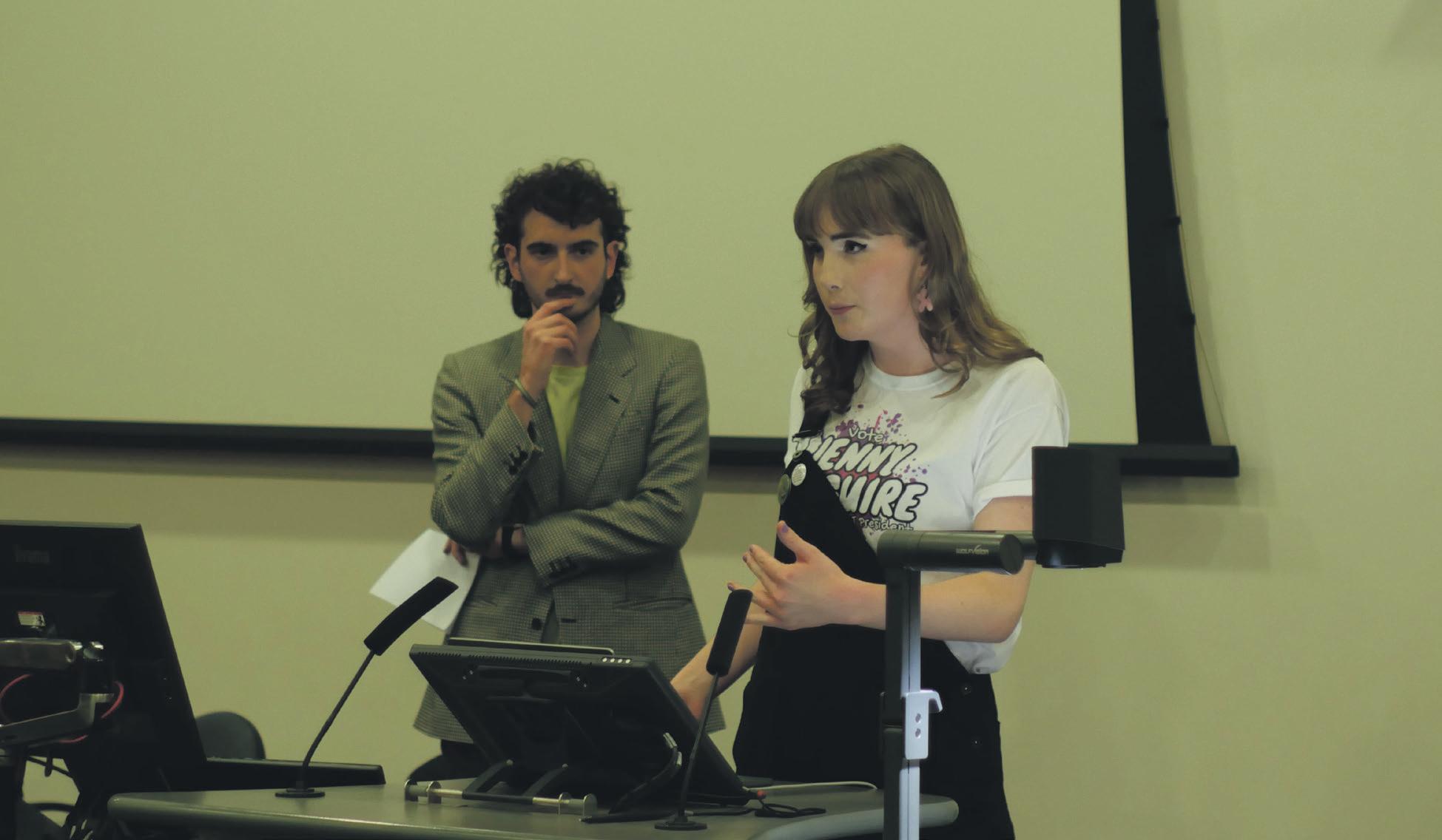
dhin was “confident that working with the Irish language officer will be able to behind the movement to make that a reality on campus”. Ó hEidhin further affirmed that this issue would be “pushed on every single committee” and “brought up in every single meeting” should they be elected.
Gilroy praised “historic goal that was achieved” by the success of the YesGaeilge campaign, identifying a “real willingness… in promoting the language” within the student body. Touching on the absence of the Irish language in his manifesto, Gilroy said his manifesto was “foundational”, explaining that “as this campaign goes on, more policies will go out there”. While the issue of the Irish language at times seemed like an afterthought to Gilroy through his manifesto ethos, Gilroy was aware of the behind-thescenes work involved in the role, as he identified that “College is willing to commit to this”.
At the council hustings later on in the evening, both candidates were asked what they would do differently to improve the rights and status of working students. Gilroy relied on his own experience as a working student, saying that he “fully understood the difficulties”. He noted this issue as “a cornerstone of his foundational manifesto” and stressed the need for “a concerted effort to work with students” and to “make it a priority”. He was adamant in his criticism of College on this issue, highlighting that they have “no real sense of empathy” on the issue.
Where Gilroy was practical, Ó hEidhin remained sceptical, saying that the reality of “long-term policy is that you have to do it again and again… until College listens”. Slightly wary, Ó hEidhin, confirmed that they “wouldn’t do anything different”, explaining that “at the end of the day, things just need to continually be pushed for”. They underscored their persistence and dedication, expressing their willingness to “repeatedly argue the point with examples and case studies of students who are actually struggling” in order to “get the emotions across to the staff”.
Overall, both candidates appeared well-equipped for the realities of the role they will contend. Both spoke with conviction, drawing upon their years of experience within the union and expressing several similar aims in their planned approaches.
The Education Officer holds the dual role of the union’s Vice President, and while Ó hEidhín’s realistic
approach may more accurately reflect the behind-the-scenes requirements of the post, Gilroy’s optimism may lend itself well to the spirited campaign Maguire looks likely to lead. In a competition where the levels of passion and preparation seem equal, the race will likely be a close one, and it remains to be seen whether voters will resonate more with Gilroy’s ideology or Ó hEidhin’s proposed policies.
Welfare and Equality
The three candidates for the position of Welfare and Equality Officer were first asked how they would fight for reproductive rights when abortion remains inaccessible for many students outside Dublin.
While Nathan Harrington referred to the 2018 referendum as the “repeal the eighth thing”, he stated that he viewed abortion access as a “fundamental” and “critical” healthcare issue and promised to raise awareness and lobby for improved access.
Hannah McAuley’s ideas to improve abortion access were more specific, as she proposed collaborating with the USI to organise “nationwide protests”. She stressed the importance of making information accessible both online and in-person and stated that the conversation “needs to leave the back of bathroom cubicles”.
While they acknowledged that he did not have relevant statistics readily available, Hamza Bana presented perhaps the most concrete solution to address the issue, promising to push for greater access and advocacy by highlighting the university’s connections to medical practices that provide abortions.
Asked how to improve support for student parents, McAuley suggested hosting more events and collaborating with the Comms and Marketing Officer to publicise them. She promised to make herself available to student parents by accommodating their schedules, stating, “whenever you are free, I am free” and suggested implementing an open-door policy and tailoring the office hours of the Welfare Officer to better suit student parents. That the position went unfulfilled for so long was a “travesty”, she said.
Harrington said that he had not known of the existence of the union’s Student Parents’ Officer until “two weeks ago”, which may raise questions about his levels of engagement and awareness with the union in comparison to current part-time
officers Bana and McAuley. He said that he would raise awareness, but did not say how, and that it was important to make himself accessible.
Bana connected the personal to the political in referencing their experience as the child of a single mother, and stressed the need to increase the visibility of various supports for student parents such as nursery services and grinds. He also expressed an intention to work towards reducing the costs of such services.
In a variation on a theme that appeared in all races, the candidates were then asked how they would make online health services available through Irish.
Bana, in a probable nod to his recently-announced partnership with the counselling services to provide a dedicated support group for ethnic minorities, said that the union must push for Irish speaking therapists as well as POC ones. “We need people who speak Irish in the services”, they said, and suggested the creation of a database of Irish-language speaking therapists students could consult.
McAuley referred to the solution as “two-pronged”, proposing first making available a “database” of who in the Health Service speaks Irish, and then letting students know how to avail of their services.
Harrington echoed Bana and McAuley’s ideas in saying that the union should “make everyone aware of Irish supports available … and make them more accessible”. Unlike Bana and McAuley, he did not provide any ideas towards implementing this.
In a round of individual questions, Bana was asked how they would address the “structural issue” of period poverty. He said that he would partner with the Estates and Facilities department, citing the policies of the University of Limerick and University College Cork as examples of how this could be achieved.
McAuley was asked about how she intended to change the “major shortcomings” in the SUSI grant scheme. She said that she knew “how unforgiving and what a barrier” the associated thresholds can be, and that she intended to employ “direct action in collaboration with as many people I can get”. She said that she hoped to collected student testimonies and “bring that to the Dáil”, to highlight the real lives and stories of the students affected.
Harrington then faced an individual question about the derogatory language that featured in his manifesto. In his manifesto, he referred
to students with disabilities as “disableds” and proposed “LGBTQIA+ lectures to teach people how to have queer sex”, with “demonstrations and practice sessions to be made available”. Harrington responded that he “wasn’t trying to be mean”, and that he intended to make Trinity a “fun and happy” place.
More individual questions followed in the subsequent council hustings. Harrington was asked about his manifesto pledge to donate 100 per cent of his salary to “giving out sweets and chocolate” to students, and whether this money would be better spent on the financial assistance scheme for transgender students. He said that his dedication to buying Cadbury bars “would go further than a lump sum to a foodbank”. He reiterated his commitment to living on campus with his “homies”.
Bana was then asked why students should feel assured that he would help to provide affordable housing. They proposed implementing a series of workshops in halls to ensure that first year students would “know their rights”, and introducing a “donation system” in House Six where students could donate household essentials to alleviate the financial burden of others.
Finally, McAuley was asked about her proposed increase of the student welfare loan and how it would work. She said she was willing to “push back” on administrative opposition to increase the loan to “as high as we can get it”. Without providing a concrete number and while admitting that she has yet to contact anyone about her plans, she reaffirmed that she was “100 per cent committed” to doing so.
Communications and Marketing
The candidates, Connor Dempsey, Sarah Murnane and Beth Strahan, were first asked about their ideas for reducing waste at Union events, namely the production of tote bags for the Freshers’ Fair every year. All the candidates admitted that they didn’t know the specifics of how the Union’s production of tote bags harmed the environment, with Dempsey and Murnane instead focusing on tackling waste by reaching out to those with more knowledge, and Strahan drawing attention to what she saw as bigger environmental issues facing College.
Dempsey said that he is “fairly inclined to follow anything environmental” and that before any decisions concerning an issue like producing tote bags would not be made without “consultation”. Currently being the TCDSU’s Engagement Officer, Dempsey argued that engagement would be his immediate priority were he to be elected and in order to follow through on this would include elements of the TCDSU’s Environmental Policy in relevant Union communications. Murnane would seek to “consult those who know more”, pointing to a “collaborative” approach in solving environmental issues at College. She said she was “on board with anything to do with sustainability really” and specifically mentioned the future Environment Officer as someone she would seek to include in any relevant communications work she produced.
Strahan used the opportunity of a question about the environmental impact of the TCDSU to highlight
4 NEWS The University Times Monday 26 February, 2024
Leah Downey, Sáoirse Goes, Alex Payne and Clara Roche
PHOTO BY ALEX PAYNE FOR THE UNIVERSITY TIMES
what she saw as “bigger issues” concerning Trinity’s carbon footprint, saying that, for now, “engagement through tote bags and pizzas” are a key part of involving students during Freshers’ Week. She would instead seek to bring “more focus on college wide energy usage. Where is it getting it? Is it renewable? How much water is being used? There are bigger issues at hand which need to be platformed as well”.
Contextualised by reference to the Dublin Riots, the candidates were then asked about how they would seek to combat misinformation.
Murnane acknowledged that the emergence of far-right groups was “becoming [an] incredibly important [issue]” and that she would seek to combat this by providing as much information to students as possible through Union communications. She also gave a reflective response, highlighting that “you can’t control what others say, only what the Union does” but that it was important to be “as honest as you can” and give “updates as they come” during uncertain times, displaying what was seen as a considered approach to misinformation.
Strahan stressed that “we have to hold ourselves critically accountable for where we get our information from”. She, like Murnane, acknowledged the dangers of misinformation that “targets vulnerable people and minorities”. In order to combat such threats, Strahan said that she would use her position within the Union “to platform the role of part-time officers” to “let students know who the people are whom they can get help from before any crisis happens”.
Dempsey drew on his experience of being in House Six during the riots in his answer. He described it as “really heartbreaking” to witness how students were affected by the activities and rhetoric of the far-right, saying “the riots were an opportunity to remind us that our service is to students”. He told the audience his “sole goal” would be “to defend students”, and in relation to the LGTBQ+ community this meant “not just putting up pink posters saying ‘gay rights’, we are showing queer people exist”.
In the penultimate question of the Equality Hustings the candidates were asked how they would ensure there is the same presence of the Irish language as English in Union communications.
Strahan answered first, not only acknowledging the need for bilingual communications but also that she wants to see Irish established on a “curriculum level”. On cementing Irish in the first-year student experience, she said: “In order to see actual change where I really want to go is the JCR, it has autonomy and does not have to do what the SU says. This would be to ensure JF students are getting the same level of Irish as the rest of the students on campus.”
Dempsey also recognised that “all communications have to be bilingual”. He said he would take an “experimental” approach in finding “where we can institute Irish” and in “ways to use Irish”. He drew attention to his Union experience through which he has already engaged with Irish translators, by whom he has “learnt the joy people experience in reclaiming their language”, citing this as motivation to continue and increase collaboration with Irish translators.
Murnane began by claiming “I’m all there for it”, calling the promotion of the Irish language “the hot topic of this campaign”. She sought to use the question to highlight her plans for “massive social media expansion”. She wants to produce more “video content, TikTok content, Facebook content, everything”. Coming round to focus on the specifics of the question, she said she “would love to do more of that”, in reference to prioritising Irish language posts with the Eng-
lish translation in an accompanying plain text version. “More of it needs to be done”, she concluded.
The panel then asked questions specific to the candidates’ manifestos. Dempsey received the first question, concerning gender equality in Union communications.
In response, Dempsey drew on his personal experience in recognition that “gender is complicated”. He said that people had come up to him and explained their experiences he found similar to his own, coming across those “who don’t really understand what is going on with their identities”. He said that aspects of promoting gender equality can appear “tokenistic”, but argued “it’s also not. It’s worked for me and can work for others as well”.
Murnane and Strahan were then both asked the same question about accessibility in Union communications, as neither had mentioned it in their manifestos.
Murnane focused on translations for her answer, reiterating her aspirations for “social media expansion”. She said “access is about giving people the opportunity” to engage and that she would bring her “hard work ethic” to the role in order to produce posts “every day”. She said she would reach out to communities and ask “what do you want?”, arguing that she would be able to fulfil any request. Strahan alluded to some “critical understanding” of how she views communications. She argued that “language takes precedence” but also acknowledged that “society is becoming more visual” so would seek to produce more video content. She drew on her previous experience working in theatre, claiming that through this she had “seen a precedence of movement and physicality over language”. She also pointed to her intention to establish a “podcast style update” of Union activity for students.
In the Council Hustings, the candidates too fielded individual questions specific to their manifestos.
Up first, Strahan was questioned about the use of the term “apolitical” in her manifesto in reference to depoliticising the Union. She began by saying that “I do not believe the Union should be apolitical”, further explaining that what she meant by her use of “apolitical” was to highlight how she wanted to prioritise “making the Union accessible”. She then continued to argue that “we need to explore our moral interrogations further”, elaborating that this constituted “aligning ourselves with morals” and associated with brands deemed in accordance with the TCDSU’s aims.
Murnane was asked about the perceived neglect of minority groups mentioned in her manifesto and as a result, whether she had consulted with any relevant bodies.
She claimed that she didn’t want “to exclude anyone” under her plans for the “big expansion” of the Union’s communications. She pointed to how she would be “very proactive” in reaching out to relevant bodies in the future and “didn’t want to seem like I was just throwing it out there” by referencing groups with protected characteristics”. She did however display a nuanced approach to the specific demands of minority groups, saying she would seek to “individually deal with this on a case-by-case basis…we have to tailor our response to specific groups”. Dempsey was asked about what he had learnt in his role as this year’s TCDSU Engagement Officer and how he would bring some of that experience to increase engagement, particularly with students who don’t attend Council.
In response, he stated: “Council is awful.” He cited his experience of “talking to students” and the “time spent with the Engagement Working Group” to help explain Council to students through “summaries of what the hell motions are doing”. He would also look to increase
the Union’s physical presence at St. James’ Hospital to increase engagement with medical students –“everyone is lovely there”.
Ents
When asked how he would work to make Ents accessible to students who commute to College, sole candidate Peadar Walsh spoke of his intention “to push the boat out further with that”. He mentioned plans to encourage societies to hold more daytime events, as “there is too much focus on evening and drinking events when people might have to get a bus home”. Walsh further stated his commitment to “supporting societies” to achieve a balance of daytime and nighttime events, and introduced his plan to create the role of daytime officer on the Ents committee.
When pushed on this point in the council hustings, Walsh was reminded that societies are run by the Central Societies Committee (CSC) and asked how he would ensure that societies ran daytime events. Walsh mentioned Samuel Isijola, chair of the CSC, and confirmed that “we have no influence over them as Ents”. He nevertheless affirmed that he would “make supports available to them [societies] that will benefit them”. Although vague on how this policy would look practically, Walsh stressed that “societies are the lifeblood of the college, the more we put into them as Ents, the more it will come out in student life”.
Citing the rising number of issues with bouncers in off-campus events, Walsh was then asked how he planned on improving inclusivity in events to ensure that they are safe. Walsh criticised the “shocking standard of care in nightclubs in Dublin”, lauding the Empower the Voice Dublin movement for their seminal role in raising awareness of this issue. He focused on drawing wider attention to the issue, imploring officers in other colleges to join him in “put[ting] pressure on these venues”. Adopting a radical approach to the Ents role, saying that “if we have to boycott venues, we boycott venues”. Walsh was unshakeable in his resolution, noting “I cannot organise an event where I think someone is going to be mistreated or discriminated against”.
Although he did not explicitly mention LGBTQ+ or minority groups in his answer, Walsh was informed and assertive in his assessment of the current situation, proposing feasible and necessary solutions to an increasing safety issue.
When asked what steps he would take in order to incorporate the
Irish language into Ents, Walsh echoed Mac Brádaigh in his assessment that the “Irish language has to become a part of every single thing we do as a students’ union from here on out”. Walsh intends to introduce an Irish language officer to the Ents committee, with the ultimate goal of having the language as an “option in every single event”.
Keeping his answers brief throughout, Walsh seemed all but assured of his guaranteed win. Although his commitment to welfare and safety at events was well received, voters may question reluctance to acknowledge the position of Ents within the union as distinct from the CSC.
Gaeilge
Pádraig Mac Brádaigh, the sole candidate for the inaugural position of Gaeilge Officer, first addressed his plans to ensure the availability of welfare support for students through the Irish language. While he admitted that these plans were absent in his manifesto due to space constraints, he expressed his belief that health services should be made available through the language. He pointed to the existence of Irishlanguage speaking counsellors in the university, stating that this information should be better publicised.
To boost the Irish language for access students, Mac Brádaigh said that the newly-created position must serve a wide range of students. Acknowledging that students entering Trinity through access programmes may not currently have the same opportunities to engage with the language, he stressed his experience in “creating learning resources and teaching people at all levels of Irish” as equipping him to bridge this gap.
To promote the Irish language to other international students, Mac Brádaigh highlighted his experience teaching Irish classes at the Pav and with An Cumann Gaelach. He suggested organising classes targeted specifically at international students, saying that his own experience as an international student gave him “a lot of perspective” in this area. The implementation of such classes would give international students the opportunity to feel a sense of belonging and community.
When asked how he hoped to increase the provision of Irishspeaking courses across faculties, Mac Brádaigh said that he was aware of the multilayered process of restructuring and providing bilingual course content. He said that he would focus on beginning these procedures to “provide
a strong foundation” that his successor could build upon, and that he would like to see College commit to action plans to ensure this.
As Mac Brádaigh will likely be the union’s first elected Gaeilge Officer, how he shapes the role and sets the tone for his successors remains to be seen. However, the Council and Equality Hustings made clear the depth of his passion and the strength of his vision, and the enthusiastic reaction from his audience suggests that the support of the student population is behind him.
Editor of The University Times
Answering Welfare Officer Aoife
Bennett about her plans to increase diversity within the staff, Ní Fhearraigh-Joyce proposed reaching out to “every society that involves ethnic minorities”, of which she said there were 20, to advertise positions within UT on their mailing lists. She had asked the same of the Trinity Ability Co_op, who had been “very receptive”. She was eager to reinstate the journalism course in collaboration with the Trinity Access Program (TAP), and also expressed interest in expanding the Irish-language staff.
In the same vein as his introductory speech at the Dining Hall Hustings, Hastings honed his early experience within UT and seeing the TAP collaboration “well done” under the administration of Emer Moreau. He was eager to expand upon this “essential part” of the newspaper as it would, in his view, help familiarise incoming students with The University Times. He said that connections with the Ability Co_op were “underutilised” within UT and that he is willing to “go there personally” to facilitate stronger ties.
When it came to the question of the importance of the Irish language within The University Times, Ní Fhearraigh-Joyce’s advantage as a fluent speaker was clear. Like Hastings, she suggested the implementation of small changes such as the inclusion of photo credits in Irish as “something everyone understands”. She highlighted her experience translating editorials within UT, but stressed the importance of creating original Irish-language content on top of translating existing articles. She highlighted the connections she had built with An Cumann Gaelach, and pointed to the existence of an Irish-language publication on campus as proving that UT has “no excuse” for the absence of an Irish language section.
Facing the same question first, Hastings said that “not enough is being done” to spotlight the language, emphasising the absence of Irish-language editorials. He suggested incorporating small introductions to the Irish language in the paper and on the website, such as translated bylines and headlines, which would “allow Irish speakers to feel heard in a very simple way”. He stressed his intention to form “concrete ties with societies” to recruit writers, and repeated his willingness to “talk to the people in charge” to make those connections happen.
The final question directed at the candidates centred around tackling issues related to the climate crisis. Hastings noted the “many environmental societies” and the Trinity Sustainability Project doing good work in this area, and said that the UT could increase its reporting on this topic to “help these people out in their activism” and ensure the safety of the planet.
Ní Fhearraigh-Joyce said that the climate crisis was one of the key points of her manifesto, and repeated her plans to appoint a correspondent. She emphasised her experience in climate activism, both in journalism and beyond, mentioning her foundation of the climate crisis section within TN2 and her experience on the Evergreen magazine masthead. She said that this area provided a “fantastic opportunity” to involve more STEM students in UT, and deserved a position at the “forefront” of UT.
Asked whether he believed the position of UT Editor should be impeachable, Hastings said that while he “absolutely” did, he acknowledged that it was a “very complicated process” that would likely involve a referendum. He said that while he would ideally like to pursue this goal, he hoped instead to focus on building staff welfare to a point where no impeachment proceedings would prove necessary.
Ní Fhearraigh-Joyce said that the question of impeachment “should only ever come up in a crisis point”, and said that her planned appointment of an ethics officer and her distribution of staff welfare surveys meant that such a question would likely never arise.
While Ní Fhearraigh-Joyce stayed close to her manifesto theme of expanding the staff, Hastings focused instead on strengthening his individual relationships with on-campus organisations. Overall, this evening’s hustings allowed Ní Fhearraigh-Joyce to highlight her extensive experience in climate activism and her knowledge of the Irish language, while Hastings instead centred his answers around his willingness to engage with those who knew more.
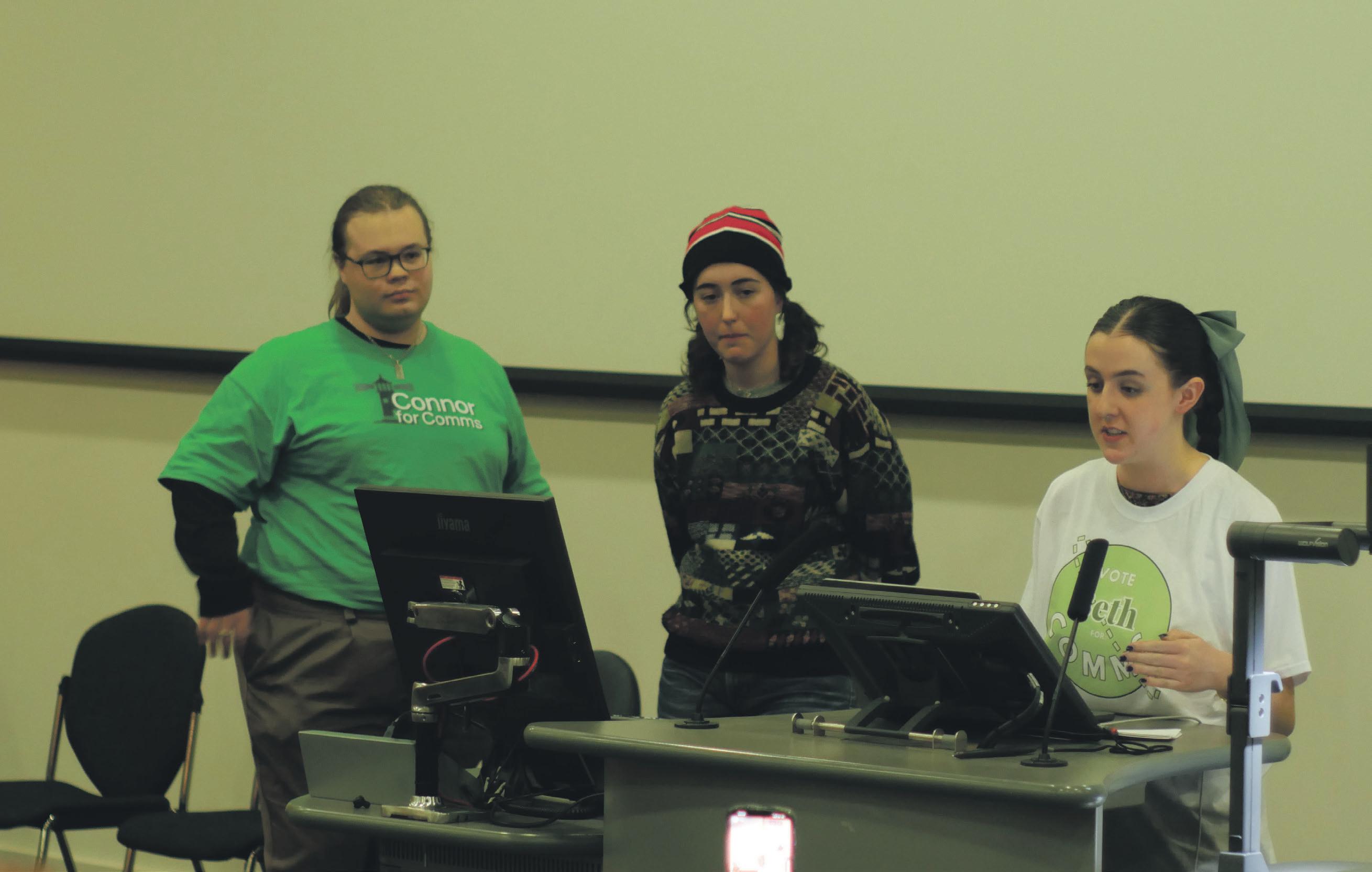
The University Times Monday 26 February, 2024 5 NEWS
PHOTO BY ALEX PAYNE FOR THE UNIVERSITY TIMES
The Cracks Begin to Show at the Media Hustings
Candidates were quizzed on the gaps in their manifestos by the editors of Trinity New s and The University Times at the Media Hustings on Friday afternoon.
Friday’s media hustings exposed the differences between the candidates running in the Trinity College Students’ Union (TCDSU) sabbatical elections. While candidates spoke with confidence, they struggled with the 30-second time limit and the probing nature of the questions.
The 13 candidates were quizzed on the gaps in their manifestos by Clara Roche and Kate Henshaw, the Editors of The University Times and Trinity News, in reverse constitutional order.
President
Mentioning her criticism of council as a “bureaucratic mess”, Roche first asked what policies Jenny Maguire planned to implement to change the shortcomings of the system. Maguire reiterated her criticism of the current system, saying, “We do so much within the first few weeks to get people in the union and then we make them sit for three hours”. She alluded to this as being akin to “cutting their hand off”. Although Maguire was quick to further comment on council as being “inaccessible, long and hard to sit through”, she did not allude to any concrete policy plans to enact the change she advocated for.
When asked how she planned to provide and enforce anti-racism training to societies with the knowledge that the Central Societies Committee (CSC) remains independent from the union, Maguire emphasised on her experience in Dublin University Players (DU Players). Maguire said that the CSC “isn’t proactive in making sure that the most vulnerable on campus are represented in a meaningful way”. She highlighted that, as president, she would represent all students. Although she “intend[s] to work with the CSC”, Maguire further plans to make training courses available for societies.
Ralph Balfe then fielded questions from both Roche and Henshaw about the comedic overtones of his campaign. When asked by Roche whether running a joke campaign risks delegitimising and trivialising the severity of the issues facing students, Balfe affirmed that he was glad there were “no joke or satirical candidates” in the presidential race. Speaking hypothetically, Balfe
cleared the air, noting “if there was a joke candidate play, they would play a helpful role in highlighting the seriousness of their opponent and asking a serious question about student engagement”. He kept up the easy camaraderie between himself and Maguire, thanking her “for standing next to” him.
To Henshaw’s question of whether he intended to stay in character if elected, Balfe questioned why “anyone would be under the impression” that he was playing a character. He reaffirmed his “cast iron guarantee” to deliver on every one of his pledges. To this, he added the colourful promise that, should he fail, he would “do a marathon of the cricket pitch in the nude”.
Building on Maguire’s intention to be the “loudest, most annoying voice in the room”, Henshaw then asked the candidate how she planned to balance speaking for people and not over them. Maguire specified that, as president, her role would require her presence in “rooms that most students aren’t in”. Maguire highlighted the importance of using her position and lifting up voices at the same time, as well as being “annoying in every room where others can’t” be.
Both candidates were then asked about their stances on Section 1.4 of the TCDSU Constitution, which concerns the political and ideological status under which the TCDSU can pursue its aims. Maguire said that the section “doesn’t represent the reality of what it’s like to run a union”. Taking the offensive, Maguire said: “My life is political and politicised by people who would rather see me dead.” She further affirmed her aim to “protect all students”, especially “women, who were taken the piss out of in this campaign”, presumably in reference to the manifesto pledges of Welfare candidate Nathan Harrington.
After being reminded by his opponent what Section 1.4 concerned, Balfe said it was an “important debate” which “gets to the point of what the SU should be about”. He reaffirmed the importance of democracy, citing his manifesto point of implementing a “president for a day” scheme, wherein he plans to “share the office with every student” for a day. In practice, he then noted, every student would only be president for “about three minutes”, but Balfe appeared idealistic in his ambitions for the policy.
Education
When asked how he plans to
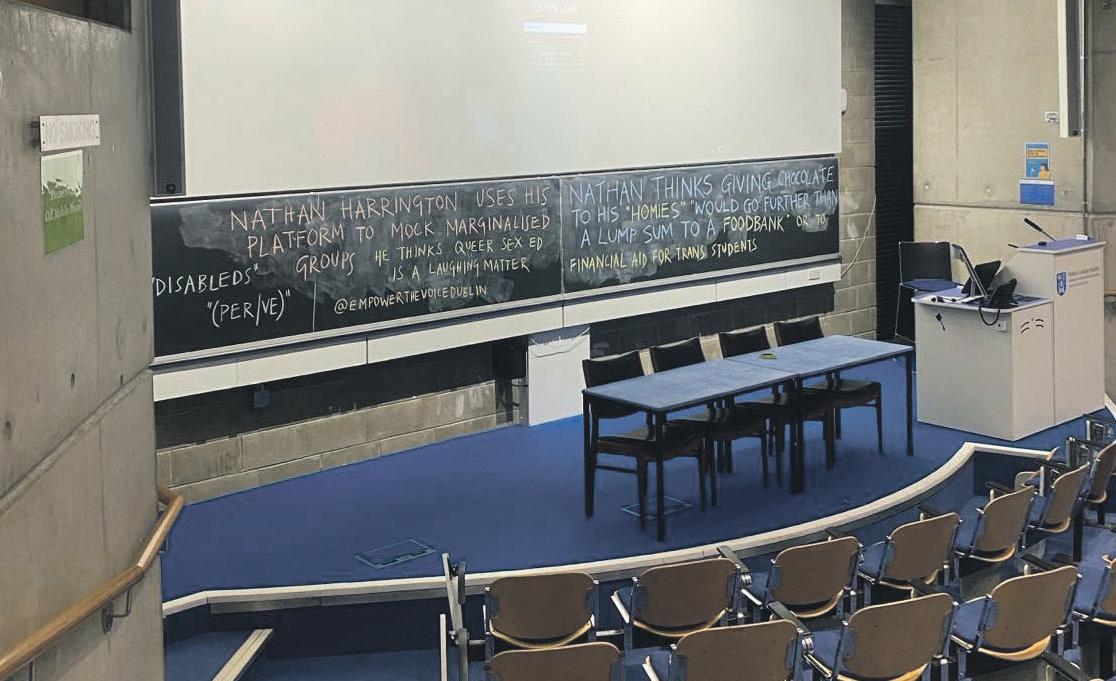
ensure policies regarding the academic use of AI are equitable across faculties and how he would include students in the development of such policies, Eoghan Gilroy said that “students are being punished for their use of Generative AI and ChatGPT”. He criticised College’s “lacklustre” and “lazy” approach.
While the 30-second time limit prevented Gilroy from laying out any definitive plans he had, Gilroy alluded to the necessity of a “more hands-on approach” and said that “students should be advocating for policies that reflect universities across the world”, but was cut off before he could enumerate any of these.
Citing a motion they introduced last year to call for every member of Union Forum to submit a progress report to council, Roche then asked Sé Ó hEidhin how they would work to make sure that students are kept informed about the work their representatives are doing. Ó hEidhin referenced her own experience of being “kicked out” of a Union Forum meeting as evidence of the Students’ Union’s inefficiency, stressing the importance of holding representatives to account but stopping short before proposing any concrete solutions.
Answering a question addressed to both candidates on how the Education Officer, as Vice President,
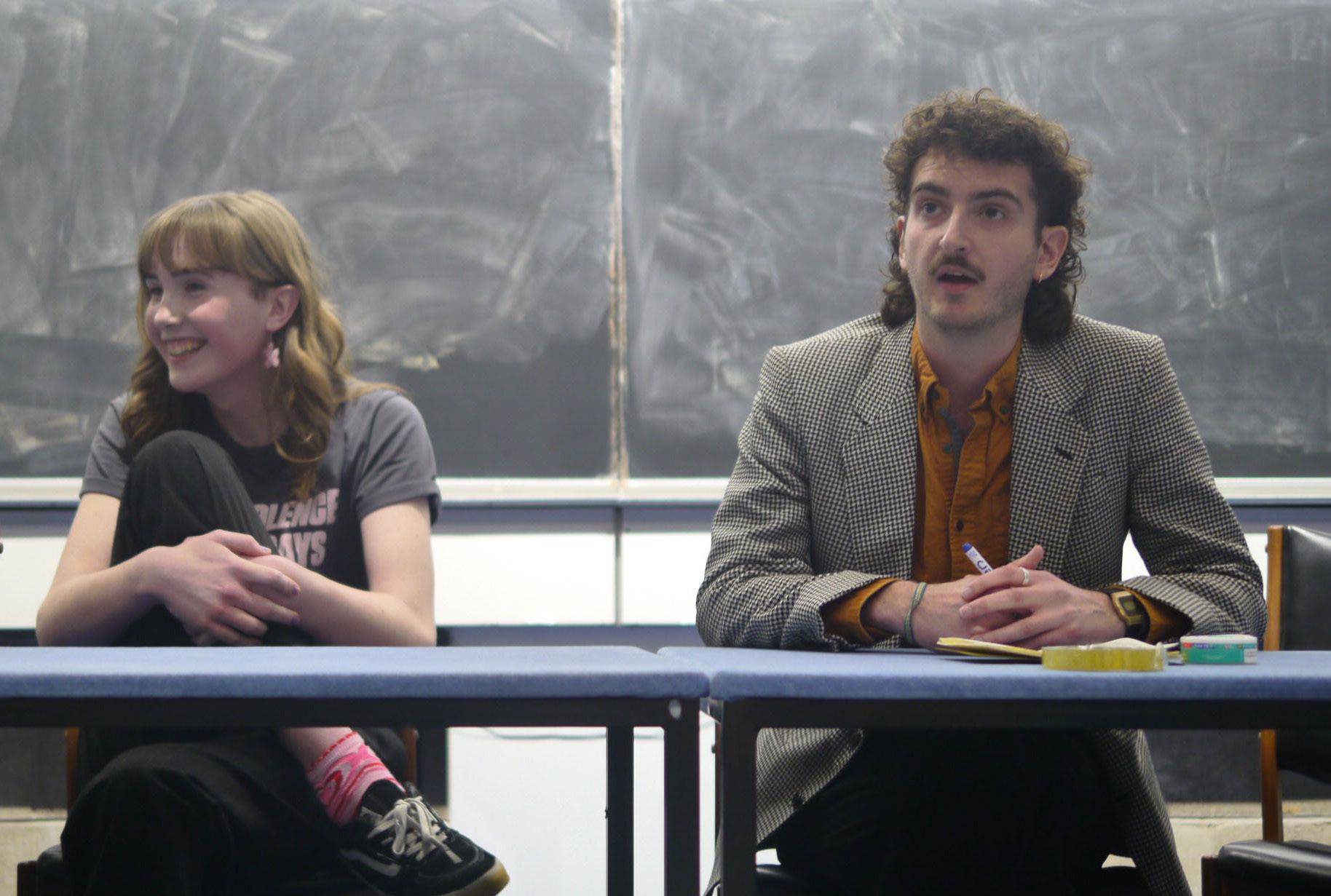
would hope to maintain cohesion within the Union, Gilroy emphasised the importance of having a good working relationship with the President while acknowledging the different responsibilities each role entailed. He said that “first and foremost” the Education Officer should ensure that students’ academic affairs are looked after.
Answering the same question, Ó hEidhin said that the Education Officer should “look inside” the Union while the President looks outside. He expounded, “the union has shown that we care about the right things and we deal with them the wrong way”, concluding: “We can’t just block the Book of Kells every time someone in the Arts Block sneezes the wrong way.”
Henshaw first addressed both candidates asking whether the Union’s focus on politics could compromise the day-to-day casework the role of Education Officer requires. Answering first, Gilroy responded, “This year’s SU has shown that this is the case”. He praised the union’s direct action, calling it “great work” that made the college listen, but said that casework had “fallen down” as a result. He said that as Education Officer, he would “put students first and ensure that [they] are being heard”.
By contrast, Ó hEidhin said that her experience within the Union before the pandemic indicated that a blend between public advocacy and behind-the-scenes casework was attainable: “We used to be just as political, and it was fine.”
Ó hEidhin was then asked how they would abolish council and replace it with three separate structures, notably an academic senate, a welfare senate as well as a legislature, as outlined in their manifesto.
“Anything other than what we have now would be better”, she replied. “The system doesn’t work [...] we blame individual people and personalities but the structure has always been the problem”.
When asked to elaborate on his earlier comments criticising the union for becoming less of a community, Gilroy explained his experience having friends outside the union, noting “it’s important to have that barrier” because otherwise “everything becomes too insular”.
Gilroy spoke with confidence and clarity throughout but struggled with the constraining time limits
imposed, often speaking out of turn. Despite this, his policies, while less ambitious, seemed more attainable in the one-year term of the Education Officer. In contrast, Ó hEidhin’s criticisms of the current system may prove unrealistic if elected.
Welfare
Welfare candidates Hamza Bana and Hannah McAuley hugged before questioning began, highlighting their mutual respect and amicable relationship. Nathan Harrington was not in attendance.
Roche opened by asking McAuley about her plans to support students seeking welfare supports but are hesitant to do so, such as student sex workers. McAuley’s response focused on having “open office hours” in “as many offices [she] can get”. McAuley promised to contact organisations for sex worker’s rights to organise workshops “for anyone who wants to come”.
McAuley also discussed how she planned to confront welfare issues at a college level, pointing towards prioritising “people in policy”. She argued that policy is “often at odds with the actual welfare of students”, but stressed that “policy is intrinsic” to the role of welfare officer in creating policies “that will work for students”.
Bana fielded a question regarding his preparedness to deal with casework, an essential aspect of the job of Welfare Officer. Bana referred to his experience as the current Ethnic Minorities Officer, having dealt with “casework in terms of racial discrimination”. In regard to how they plan to separate the outward-facing aspects of the job from the sensitive nature of casework, Bana emphasised having the “extensive knowledge” necessary to “separate them”.
Concerning the issue of institutions being at odds with the goals of the college, Bana affirmed “[he] will not stop until we get equality”. They plan to seek support within the union to show that “students care about these things”, promising to “do it again and again until college listens”.
Both candidates faced questioning about the current state of the college counselling services, particularly in how it fails to adequately represent the students it serves. Both addressed the lack of diversity within the service, with McAuley affirm-
ing her support for the Ethnic Minorities support group and the need to continue growing these services and “hiring more counsellors of colour”. Bana reiterated the need for more “POC therapists in the Student Counselling Service”, saying “[they] have done it before” and “will do it again”. He also emphasised the need to introduce an Irish-speaking therapist.
Comms and Marketing
The Comms and Marketing candidates were questioned about the confluence of the President with the Comms Officer in terms of being the spokesperson for the union. On how they planned to address this if a conflict were to arise during their term, all three candidates had similar answers. Connor Dempsey expressed that he tries to “play a mediating force in the union”, emphasising that the “Union Forum is a cabinet” and has “to work as a group”. Sarah Murnane drew on the position title affirming her belief in the Comms officer as “the glue between officers”. She highlighted the importance of being “as collaborative as you can” and being aware that the SU “represent the student body” and is “not personal”. Beth Strahan’s response echoed that of Dempsey and Murnane, referencing Comms as the “middleman” of the union. She added that interpersonal conflict in the union has to “reflect conflict in the wider student body”.
They were then asked their outlook on whether the SU should be apolitical, and, if not, how being political would impact the sponsorships and partnerships they planned to establish if elected. The candidates differed in their approach to this question, with Dempsey claiming that “TCDSU has a very strong brand and he has “no concern” in finding partners. With reference to the student population, Dempsey said he believes that politicisation has to “reflect the needs of students”. Munane emphasised the SU as a “democracy”, acknowledging that “people are going to be political”. According to Murnane, “political values can be put forward” but if TCDSU is “going to take action”, the SU must “take cues from the student body”. Strahan took the approach that the SU “is not apolitical” but must focus on “making the politics accessible”.
6 The University Times Monday 26 February, 2024 NEWS
Sáoirse Goes, Deputy Editor Leah Downey, Deputy News Ed.
PHOTO VIA @EMPOWERTHEVOICEDUBLIN
PHOTO BY BRIDGET MCBRUISER FOR THE UNIVERSITY TIMES
On the topic of student engagement, Dempsey said that it cannot be measured by who is “reading weekly emails and going to council” but by whether “people are using our brand deals”. He wants “people know they’re part of an organisation that matters”. Murnane expressed her wish for people to get more involved in the union and council meetings because that is where “motions get voted on”. She plans to build a community that encourages people to become “actively engaged”. Strahan spoke of gauging student engagement by platforming the resources that TCDSU has available and “taking that responsibility” to make students aware. She drew on students not knowing “which buildings are wheelchair accessible” and emphasised it is the job of the Comms officer to make students aware.
During individual questioning, Dempsey was asked about what stopped him from bursting the SU bubble in his role as Engagement Officer. He explained that he “wrote the role because [he] was tired of hearing people complain and not do anything”. Drawing on his union experience, Dempsey claimed that there was a “higher turnout” in both referenda and class representative elections.
Murnane faced questioning about accessibility, to which she stated that her goal with the SU is to “bring everyone along”, hoping to achieve that by increasing engagement. She plans to achieve this by “broadening it” as much as she can, emphasising that she “wants everyone to view the union as a wider community than themselves”.
Strahan was asked about her lack of experience in Union politics
and how she plans to adapt to a role within the SU, to which she responded that she “is not engaged” in the union itself but that she is “a political body”. She stated she has “spent time” researching and reaching out to people in the SU but hopes that “as a new face” she can combine her outside experience and learn from previous officers.
Oifigeach na Gaeilge
Sole candidate for Oifigeach na Gaeilge (Irish Language Officer) candidate Pádraig Mac Brádaigh responded to questions about his plan to organise Irish language classes by stating he would be “willing to teach them [himself]” and that running these classes would be a “great way” to boost engagement with the Irish language. When asked about his manifesto point to campaign for the option to write dissertations in Irish, Mac Brádaigh reiterated his belief that students should “be able to write in Irish regardless of discipline”. However, he acknowledged that such a goal would be unrealistic in the timeframe of one year. He explained that “there are a lot of admin levels of bureaucracy”, adding that he was “not aware of those things”.
Mac Brádaigh was then questioned about how he plans to work alongside other Sabbatical Officers, to which he referred back to his manifesto which has been broken down “into parts based off other Sabbatical Roles”. He said he is committed to providing Irish in “every aspect within the union” which would mean “working in close proximity with other officers”. Mac Brádaigh stated he was
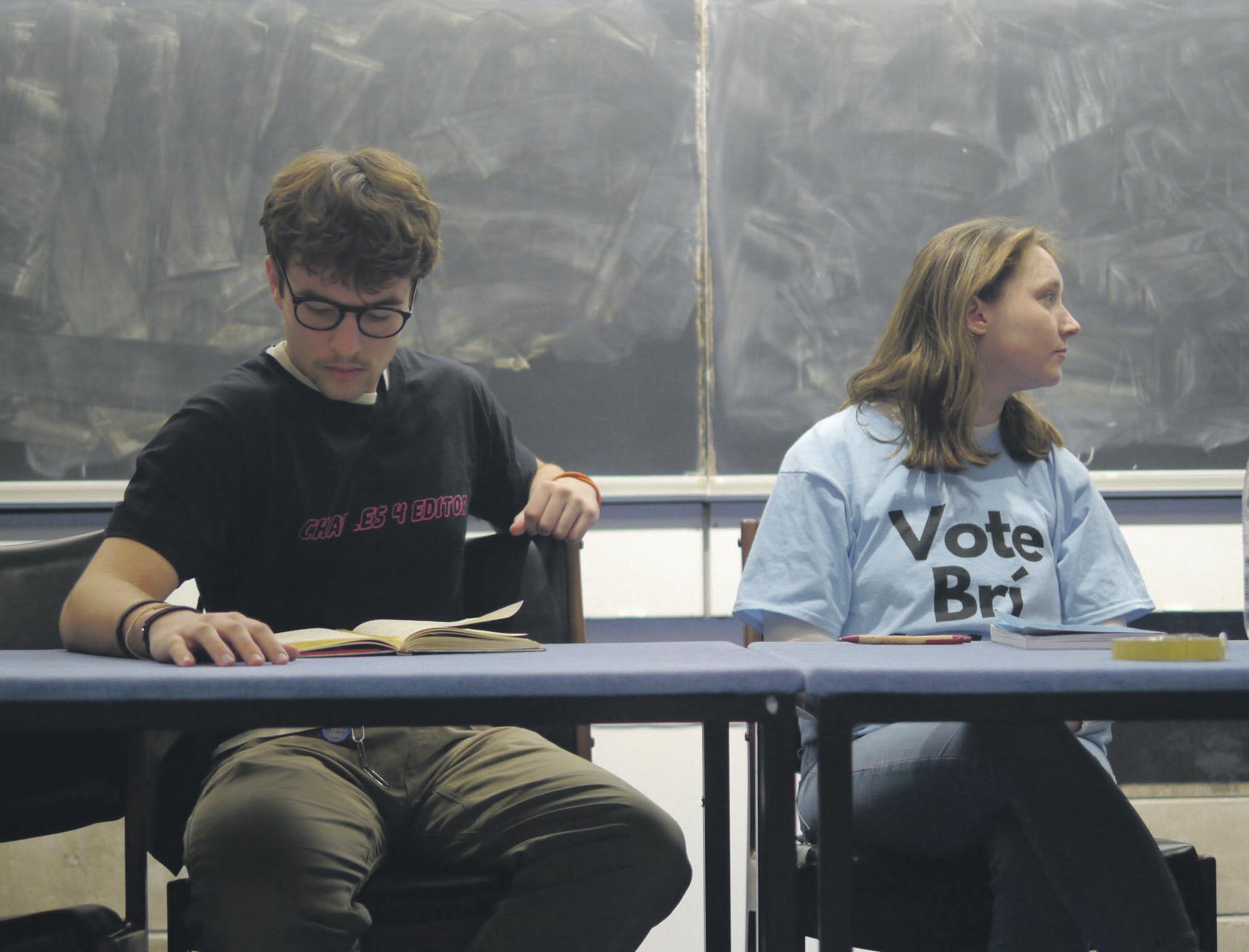
“thrilled” with the emphasis being put on the Irish language in this year’s elections.
Part of the terms included in the referendum referred to the distribution of funds amongst capitated bodies within the college. In regards to this topic, Mac Brádaigh disclosed that the SU would be paying for the position this year and that the bodies would not receive funding until 2025. However, he affirmed his commitment to continue talking to capitated bodies and ensuring “Irish is in all the blocks”.
Editor of The University Times
Candidates Charlie Hastings and Brídín Ní Fhearraigh-Joyce were tasked with explaining how they planned to ensure all aspects of the paper received equal attention and not only news. Ní Fhearraigh-Joyce proposed highlighting Radius con-
tent on social media as a possible way to garner more outward attention. She referred again to her manifesto point of expanding The University Times by hiring “a lot more staff” paper-wide, focusing especially on hiring Irish editors, Science and Technology Editors and Art and Culture editors.
In contrast, Hastings’ approach focused on staff welfare. Hastings said “[he] wishes it were as simple as recruiting new staff”, noting it had been talked about repeatedly in past campaigns and failed. Hastings referenced speaking to students over the course of the campaign week who “have never heard” of The University Times or would rather read Trinity News. Hastings emphasised the need to first “establish a space in which staff feel safe” before recruiting new members. Both candidates then faced the question of whether the role of
editor should be impeachable. Hastings, who was fired for trying to impeach the previous editor of UT, said he “absolutely believes” that the Editor should be impeachable. He continued to say that the SU “can’t have a democracy” without having the ability to impeach editors “through democratic processes”. Hastings acknowledged that making the role impeachable would be an extremely “long and arduous process” involving “a lot of red tape” that would be hard to clear but that he would be willing to pursue it.
Ní Fhearraigh-Joyce’s response to the question focused more on interacting with students as a more effective approach, although he was “not against” it. She proposed hosting “town halls” to provide students with the opportunity to give the Editor feedback on how the paper is being run. She emphasised that The University Times should “be responsible towards students”, adding that for the Editor to become impeachable would require a referendum which “[she] is not sure students would want”.
During individual questioning, Hastings was asked about his plans to “outsource responsibilities” such as the Irish language and accessibility to other existing organisations on campus. Hastings clarified that his plan was not to “specifically allocate responsibilities to other groups” but to “increase ties with societies” so they can approach the paper themselves to “increase visibility for their groups”. Referring again to his interactions with students during the week, Hastings noticed that most students “had not heard of half of the societies on campus”.
He stated that he plans to have the Societies Editor and the Visibility Editor – a role he plans to create should he be elected – work together each month to highlight a select group of societies. Discussing his managerial experience with The University Times, including being fired, Hastings acknowledged that he “lacked certain experiences”, but that his turbulent relationship with the paper has been a “massive learning experience” for him. According to Hastings, his involvement throughout various scandals has shown him “what a failed welfare state” and a “lack of attention to writers” can do, noting that it “destroyed the paper for a year”. Ní Fhearraigh-Joyce was then questioned about her goal to hire several Ethnic Minorities Editors and if creating such a role risked pigeonholing individuals. Joyce responded that she was advised by the Ethnic Minorities Officer, Hamza Bana, that it is “really important” to have people “with lived experiences of issues” to be involved with The University Times. She added that she “does not expect the sole burden” of this role to be carried by those involved and that she plans to support them throughout. She was then asked by Trinity News about her candidate interview, in which she became “agitated”, and how she plans to mentor students on interview procedure in the future if this is how she reacts when interviewed. Joyce admitted that she “didn’t come off well” and that she was “not used to being the one interviewed”. She stated that she has “taken on board” that mentoring students is done through listening and “not letting things get heated”.
TCDSU Elections: Things Get Fishy at the Piranha Hustings
Thursday’s Piranha Hustings at Doyle’s Bar forced the candidates to demonstrate their comedy chops.
The first Piranha hustings since 2017 took place last night in Doyle’s Bar. The editors of the satirical magazine took to the stage to grill the 14 Trinity College Dublin Students’ Union (TCDSU) sabbatical election candidates on their policies, promises and personal lives.
The two candidates for the position of Editor of The University Times were first asked to write an article about their favourite toilet stall on campus. Speaking first, Brídín Ní Fhearraigh-Joyce expressed a preference for the “Hamilton glory hole”, in its ability to represent students “who want to be fucked by random strangers”.
Hastings, in a more measured but less ambitious answer said, “that one next to Front Square”, presumably referring to Regent House. Hastings’ ignorance of the geography of the university may raise questions as to whether an American can confidently lead the second-best publication on campus.
Hastings, as the former Music Editor of UT, was then asked to rate the host’s “sick beats”. In a polemic appraisal that may prove polarising among his constituents, Hastings said that the aforementioned “beats” “kind of sounded like a submarine radar”. In an act reminiscent of former Soviet Union president Boris Yeltsin, who in 1994 drunkenly disrobed in the presence of Bill Clinton, Hastings downed his pint before answering. Critics will note that he did not get it down in eight.
Ní Fhearraigh-Joyce, as the former Editor-in-Chief of TN2 magazine
and one of 18,400 contributing writers for Trinity News, was then asked which of the three she would “fuck”, “marry” and kill”. She said that she would have “hate sex” with UT, “kill” Trinity News and marry TN2 because “it’s for life”. Her reference to the obscure and soonobsolete TN2 magazine will likely puzzle readers unfamiliar with the third-best publication on campus.
As the sole candidate for the position of Ents Officer was not in attendance, the Piranha editors instead produced a man who looked a bit like Hozier.
As the sole candidate for the position of Irish Language Officer was not in attendance, the Piranha editors instead produced a man who looked a bit like Hozier.
Asked about the worst thing she has submitted to Trinder, Comms and Marketing candidate Sarah Murnane said, “I have no idea, this is not funny, I’m so sorry”, echoing her statements in every UT meeting she has attended since the beginning of the year.
The authors of this article cannot remember what Connor Dempsey said in response to this question, perhaps due to the pre-drinks they attended before the Piranha hustings.
Beth Strahan, in a nod to her efforts to expand the social media presence of the Students’ Union, said that while she had not submitted anything to Trinder, she had matched with her lecturer on Hinge.
Then asked about her experience writing for the Trinity Film Review and whether this will help her in writing an email that nobody reads, Murnane said “no-one reads [Trinity Publications] either”, prompting sighs from the 18,400 Trinity News contributing writers in the audience, as well as from Lara Mellett, the current chair of Trinity
Publications, whose efforts towards a diplomatic Pax Romana were evidenced in her decision to attend the UT pre-drinks.
In the Welfare race, Hamza Bana was represented by their campaign manager, who sported a t-shirt emblazoned with the words “Short King”, presumably in reference to Bana’s height, or lack thereof.
Presented with a first-year student who had shit himself, Welfare candidate Nathan Harrington said that he could relate to a wide range of experiences that first-year students face on campus, to which an audience member responded: “Virginity?” The actual status of Nathan Harrington’s virginity is unclear.
Asked whether she plans to create a support group for students with little to no prospects, Hannah McAuley pointed to the existence of the PPES course group chat.
The host then asked Harrington about the “plenty of jokes” in his manifesto, saying: “We just wanted to ask who your comedic influences are, because we can’t discern any.” Harrington responded that his manifesto was “100 per cent serious”.
Education Officer candidates Eoghan Gilroy and Sé Ó hEidhin were then asked which building they would destroy on campus. Gilroy, as Arts, Humanities and Social Sciences (AHSS) convenor, reaffirmed his plans to destroy the Arts Block, citing “everyone in their fucking outfits […] smoking rollies” as motivations for the planned destruction.
Ó hEidhin said that they would destroy the “big red box”, expanding upon the position they asserted in today’s Media Hustings:
“We can’t just block the Book of Kells every time someone in the Arts Block sneezes the wrong way.”
Gilroy was then asked, “for a
friend”, how babies are made. Gilroy pleaded ignorance on the mechanics of procreation, and redirected the question to highlight “the issues gay people face on campus, primarily that you can’t go on Grindr on TCD WiFi”.
Having referred to Trinity’s style of assessment as “archaic”, Gilroy was asked whether he would be willing to joust for the position of Education Officer. He responded with a convoluted Game of Thrones reference that alienated the authors of this article, whose cultural knowledge begins with Gilmore Girls and ends with Glee
The evening culminated with the interrogation of the two presidential candidates. The format of the evening meant that Jenny Maguire’s improv background worked to her advantage for the first, and probably only, time in her career. By contrast, stand-up comedian Ralph Balfe faltered when forced to recite jokes that weren’t pre-rehearsed.
Maguire was first asked about her plans for dealing with the seagulls on campus, to which she replied: “When God hands you a lemon, take the feathers off and sell it for €5.50 in the Buttery.”
Answering the same question, Balfe suggested employing the use of “seagull mind control”, indicating a perhaps controversial position on the practice of hypnosis which is widely considered unethical in the absence of informed consent.
At the after-party, which took place at [redacted]’s Botany Bay apartment, [redacted] Officer candidate [redacted] revealed discrepancies between his public position on the issue of [redacted] and his recreational use of it. The 18,400 Trinity News contributing writers were not in attendance at the after-party, presumably because they weren’t invited.

The University Times Monday 26 February, 2024 7 NEWS
Sáoirse Goes, Deputy Editor Clara Roche, Editor
PHOTO BY BRIDGET MCBRUISER FOR THE UNIVERSITY TIMES
Council 5 Fails to Reach Quorum, Takes Place as Town Hall
The fifth TCDSU council of the year failed to reach quorum on Tuesday, February 6th.
The fifth Trinity College Dublin Students’ Union (TCDSU) council failed to reach quorum on Tuesday, February 6th. The meeting was reconvened as a town hall and the discussion items on the council agenda took place as planned. The necessary number of people present to meet quorum for council is 120 members.
The town hall began with sabbatical officer reports and questions. In his report, TCDSU President Lászlo Molnárfi highlighted Domino’s removal of posts expressing support for the Israel Defense Forces (IDF) following the Union’s decision to cut ties with the franchise, calling this “very, very good news” that “shows the power of boycott”.
Molnárfi also spoke of his plans to organise a rent strike on campus. Recounting difficulties he had encountered in mobilising tenants, he said that it is “much harder to organise a rent strike than it is in Manchester because the material conditions are different”, describing the access to campus accommodation in Trinity as an “elitist, luxury process”.
Welfare Officer Aoife Bennett described the previous week’s Rainbow Week, a celebration of LGBTQ+ life on campus, “an amazing week”, in her report. In her report, Communications
and Marketing Officer Aiesha Wong requested “photographic evidence of living conditions”, in any accommodation, student or otherwise. These experiences in housing and commuting will be used for a video campaign Wong is organising with Molnárfi.
Ents Officer Olivia Orr reaffirmed her achievement of keeping Trinity Ball on campus in her report. Orr further hinted that the lineup announcement can be expected at the end of February. Tickets are also expected to be released at the end of February, with the same ticketing system as last year.
Connor Dempsey, the Union’s Engagement Officer, brought forth the findings of the Engagement Working Group, designed to increase Union engagement. The group recommended a reduction in the number of elections and reforms to the structure of debates within council. He noted that “the current system does not promote constructive criticism”, and that “very difficult topics are hard to handle within 90-minute chunks.”
Connor Dempsey, the Union’s Engagement Officer, brought forward recommendations for the promotion of Union engagement. Citing his experience, Dempsey presented his concern that “I’ve been told by so many people that they come to first council and never come back”. For this waning engagement, Dempsey proposed a reduction in the number of elections and opposed contentious debates at council, noting that
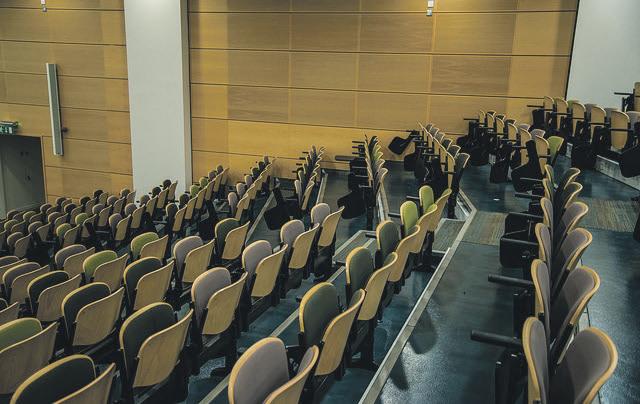
class reps do not have any input, citing that “it’s not why we elect class reps”. The Engagement Officer further noted that “the current system does not promote constructive criticism”, mentioning that “very difficult topics are hard to handle within 90-minute chunks”.
Motions brought forth to council could not be voted upon and instead were discussed.
The first planned motion, proposed by Molnárfi, sought to affirm support for Professional Masters in Education (PME) student, who according to Molnárfi the Union has
so far “ignored”, and to mandate the Union to support the Association of Secondary School Teachers Ireland (ASTI) campaign on secondary school teacher pay.
The second motion was to support the creation of a bursary for student parents, which would distribute €20,000 from the Higher Education Authority (HEA) fund over a fiveyear period. The second motion was also proposed by Molnárfi. The Student Parent Officer described this as a “small step” on a campus where “there’s nothing for childcare”.
The third motion, if passed, would
cement the Union’s opposition to the government’s Green Paper on Disability Reform, which seeks to introduce a tiered system to categorise disability. The Union’s opposition has been formed on the basis that the proposed reforms would breach the United Nations Convention on the Rights of Persons with Disabilities. This motion was also proposed by Molnárfi. Keely Jenkinson, the Officer for Students with Disabilities, compared the proposed reforms to Conservative Party equivalents in the UK enforced under austerity, which “caused horrific things for
people with disabilities”.
The fourth motion, proposed by Molnárfi, supports the creation of a Student Sport Bursary, and the fifth and final motion, proposed by Engagement Officer Connor Dempsey would amend the requirements of his position to require its holder to produce two reports over the course of an academic year, rather than one per semester.
Chair of Council and the Electoral Commission, Conor Casey, announced that the proposed referendum that sought to amend Chapter 1.4 of the TCDSU constitution would no longer be going ahead due to a “legal liability” if it were to pass.
The amendment to Chapter 1.4 sought to replace ‘the Union shall pursue these objectives independent of any political, racial or religious ideology’ with ‘the Union shall pursue these objectives in a radical, egalitarian and autonomous way, and shall not affiliate with far-right groups, including, but not limited to, white supremacists and Christian extremists.
Following a complaint that suggested such proposed wording would be incompatible with statutory anti-discrimination legislation, the EC sought legal advice and revealed its suggestions that the proposed wording is potentially discriminatory towards Christians and that it created a “potentially derogatory” association between Christianity and far-right and white supremacy.
Majority of Motions Pass at Sixth Council of the Year
The motions included supports for Student Parents, opposing the government’s Green Paper on Disability Reform and reforms to Trinity’s Virtual Learning Environment.
Oand that the TCDSU develop links with ASTI on this issue”. ASTI is the Association of Secondary Teachers Ireland.
This motion comes following Council noting “those undertaking Professional Masters in Education (P.M.E.) degrees are often unnoticed and underrepresented”. The motion draws attention to “a high dropout rate, financial difficulties and hidden costs and not being properly paid for their training working in secondary schools”. Molnárfi sought to highlight the “exploitation” that P.M.E. students face in his proposal of the motion.
Student Council agreed with Molnárfi’s sentiment in the motion that “the Union has a duty to support P.M.E. students, and that the best way to do this is through solidarity and combining our forces with ASTI”.
Following the passing of the motion, the TCDSU Student Parent
Officer, Sheila Keegan, proposed the second motion of the night, calling for the establishment of a Student Parent Bursary out of the TCDSU’s Higher Education Authority Fund. This would mean reserving €20,000 from the Fund to be distributed over a five-year period, starting in September 2024, “to ensure sustained support for student parents”.
Keegan highlighted childcare costs and commitments as the main barrier for Student Parents “playing a part in making us more visible and making it possible for student parents to access university... student parents matter.”
The council voted to pass the motion, showing support for a new bursary program “aimed at providing financial assistance to both undergraduate and postgraduate student parents”.
Molnárfi then proposed a motion Opposing the Green Paper on Disability Reform. He called the Paper “terrible and shameful” and argued that “it seeks to categorise people with disabilities into a tiered system”, something he argued “mirrored the austerity years of Tory policy” in the UK that “unnecessarily forced people into work”.
The council voted strongly in favour of the motion, enabling the TCDSU in its mandate to now “support the Scrap the Green Paper Coalition” and oppose the Green Paper “in its entirety”.
In proposing the next motion to establish a Student Sport Bursary program, Molnárfi said that council has “seen positive developments when capitated bodies work together… this is essentially doing something very, very positive in
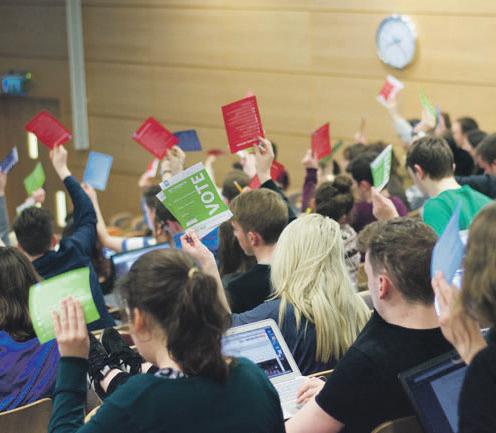
tackling a very concrete issue”.
The motion was initially proposed by 11 postgraduate students who struggled with the cost-of-living crisis and felt it impinged on their abilities to access sport by having to pay the Sports Levy, part of the Student Contribution.
Similar to the Student Parent Bursary, the motion seeks to reserve €20,000 of the HEA Fund for the Sports Bursary, which is also to be distributed annually over a fiveyear period. Students voted in favour of the motion.
Conor Dempsey, current TCDSU Engagement Officer and also running for next year’s Communications & Marketing Officer in the sabbatical elections, proposed a motion seeking to change his mandate as Engagement Officer to produce two reports per academic year instead of a report
once per term.
A member of council raised a concern that this could leave large portions of the academic year without a report from the Engagement Officer. However Council voted heavily in favour of the motion.
Current TCDSU Education Officer, Catherine Arnold, then proposed her motion to conduct a poll of Council members on whether Education Officers for the next three years should be able to collect data on teaching methods. The poll would question whether to stay with the College’s current Virtual Learning Environment (VLE), Blackboard Learn, or switch to an alternative. Arnold highlighted that following this process would enable future Education Officers to determine whether there is an alternative that “could be more accessible for students”.
Admitting that a motion on Trinity’s VLE “is not the most spicy topic”, she still implored Council to consider this motion due to any VLE’s integral part in students’ engagement with their studies.
Eoghan Gilroy, currently running to be the TCDSU’s next Education Officer, raised his concern that consideration of Trinity’s VLE should have “more student input” for a system that is used by all students, because he did not see an individual poll at one Student Council as sufficient to decide on the future of Trinity’s VLE.
The motion ended up passing. In the resultant poll, Council voted “to retain Blackboard Learn as the VLE with additional functionality”.
In proposing his motion to Amend Section 1.4 of the TCDSU Constitution, Niko Evans implored Council to “make sure those 500 students who signed the petition have their voices heard”.
Over 500 students previously signed a petition to change the wording of Section 1.4 from “the Union shall pursue its aims independent of any political, racial or religious ideology” to “the Union shall pursue its aims in a radical, egalitarian and autonomous way, and shall not affiliate with far-right groups”.
A PhD student spoke against the motion: “the SU lacks the equality necessary for any political movement”. He further highlighted “voluntary participation” with political movements, and that students, being enrolled at Trinity, are automatically members of the TCDSU, and so this constitutional change would not allow students to opt out of association with particular political parties.
Aiesha Wong, TCDSU Comms and Marketing Officer, argued in favour of the motion, saying, “people are political by nature”. She encouraged Council members to pass this motion because voting now would let “the entire student body decide whether we can be political…the point is we are giving the choice to people”.
Evans then summed up: “this is just a motion to hold a vote, letting the students of TCD to express themselves on the ballot. It usually all happens in here, which is awful.” Voting happened via secret ballot and the motion failed to meet the required 2/3rds majority needed for a referendum on constitutional change, with 64 per cent voting in favour, narrowly missing the 66.7 per cent needed.
In a statement to The University Times, Molnárfi expressed his disappointment “to see that despite 520+ signatures gathered in just 6 days, Council voted 64 per cent, 2 per cent shy of the required 66 per cent, to put our wording to be voted on by the entire student body”. He continued, explaining that “under normal circumstances, the 520 signatures would have automatically guaranteed a referendum. This sets a bad precedent in ignoring students’ wishes to hold a referendum on an issue of great importance”.
Molnárfi reiterated his commitment in the statement: “As a result of Council not letting students have a vote, we will not back down, and we will keep being political in defiance of 1.4, [the] constitutional clause cited to say the union cannot be political”. The statement specified that this would entail “continuing our stance of no-confidence in the government, which is a majority position amongst the student body”.
The University Times Monday 26 February, 2024 8 NEWS
Sáoirse Goes, Deputy Editor Clara Roche, Editor
n Tuesday evening, student council quickly voted through a succession of uncontroversial motions, except the one concerning the Union’s political status, before both the Equality and Council Hustings took place for the Trinity College Dublin Students’ Union (TCDSU) sabbatical elections 2024. The first of the four motions proposed by TCDSU President László Molnárfi suggested a mandate to “support ASTI’s campaign to ensure that student secondary-level teachers be paid properly
Alex Payne ASSISTANT EDITOR
PHOTO BY ANNA MORAN FOR THE UNIVERSITY TIMES
New Ethnic Minorities Support Group Begins March 4th
The Student Counselling Services will restart an Ethnic Minorities Support Group in collaboration with the founder of Black Therapists Ireland and TCDSU Ethic Minorities Officer Hamza Bana.
In an Instagram post on Thurs-
day, February 22nd, the TCDSU announced the new Ethnic Minorities Support Group run by the SCS. It will be facilitated by SCS counsellor Sinéad Crowley and Founder of Black Therapists Ireland, Ejiro Ogbevoen.
In the caption to the post, the TCDSU said: “We are incredibly excited to announce that TCDSU have successfully set up Trinity’s Ethnic Minorities Support Group.”
The caption also draws attention to the work of one of its part-time officers: “Thanks to the fantastic work of our Ethnic Minorities Officer.” The current Ethnic Minorities Officer is Hamza Bana, who is also running to be next year’s Welfare & Equality Officer in the TCDSU Sabbatical Elections 2024.
On the SCS website page which details their Group Counselling sessions, it says of the new group: “This support group is a therapeutic support space for students from different cultures and ethnic minorities, run with the Trinity Student Counselling Service.”
“It offers an inclusive and supportive space for members of these communities to meet, share experiences and advocate for their needs. This group will be facilitated by a counsellor in SCS and an external therapist from within this commu-
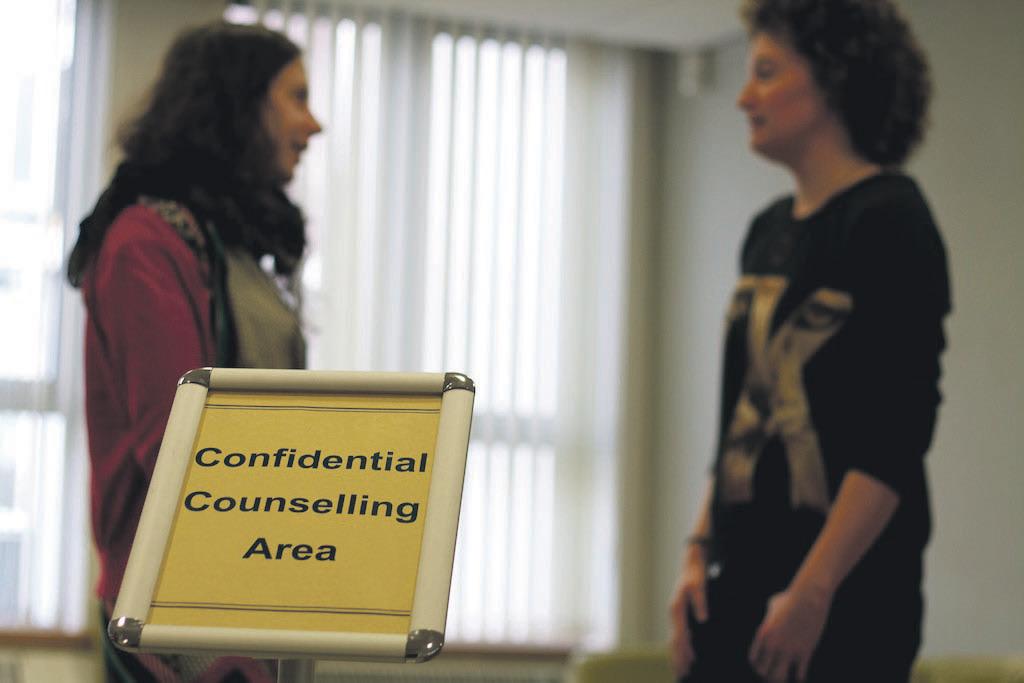
“To be on the fence for humanitarian issues or even doing the bare minimum is not enough to fight against institutional racism, you have to be actively against it.”
nity, with a similar lived experience.”
In a tatement to The University Times, Bana said: “The SCS were very self-aware when it came to the fact that they had no POC [Person of Colour] on their staff.”
“On initial talks with them they had stated that they did have an
Gaeilge Referendum Passes with Landslide
The referendum, which will enable the creation of a full-time Irish Language Officer, passed with a 90 per cent majority.
The
The
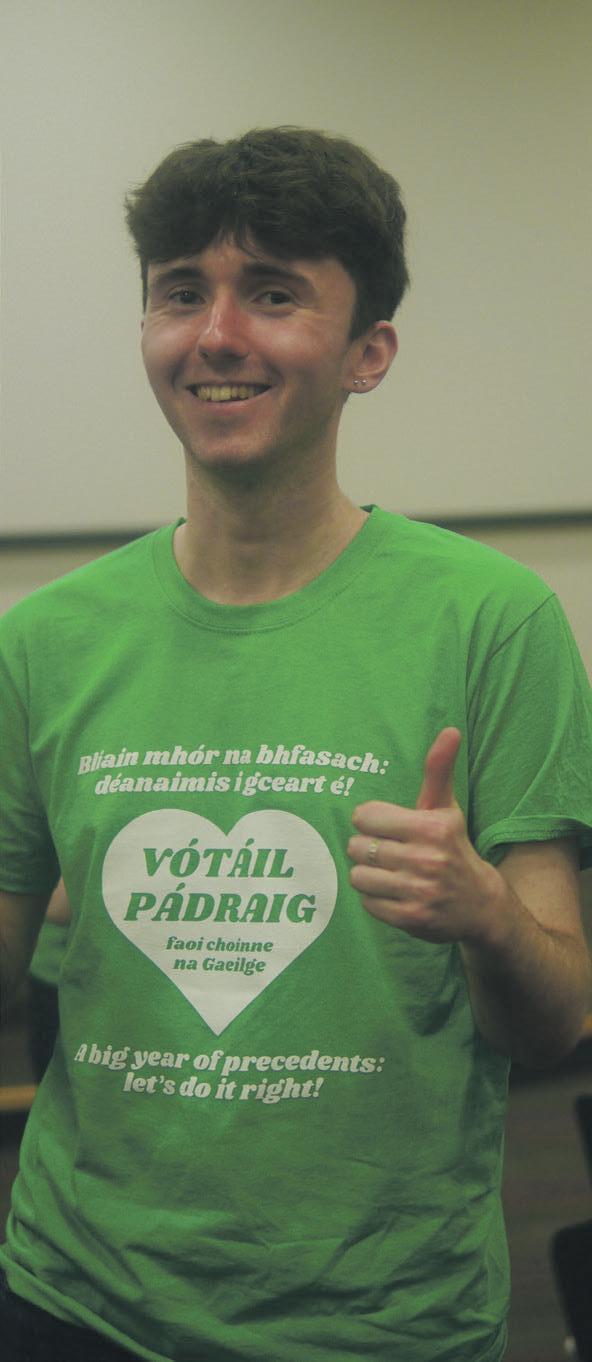
ethnic minority support group a few years ago but had stopped as they felt that there was an ethical issue on whether a white facilitator would be qualified to handle cases of the POC experience on campus and subsequently in Ireland.”
”Not to say that their endless certifications do not mean anything;
however, many students would much rather have a facilitator that looks like them as it provides a more comforting experience.”
Bana also sought to bring attention to the fact that Trinity still does not have a mandatory module for diversity and inclusivity training for staff, a key manifesto pledge in
his current election campaign: “On the topic of institutional racism, to get rid of it is to get rid of the perpetrators that enable it to happen within systems and to shift the narrative from ‘stop being racist’ to ‘fight to be anti-racist’.”
“Many of us know that to be on the fence for humanitarian issues or even doing the bare minimum is not enough to fight against institutional racism, you have to be actively against it.”
“This includes all levels of staff from lectures to security and more as there is no mandatory module for diversity and inclusivity training for staff. It is only made optional for teaching staff who showed very little interest in such a module.”
“Trinity boasts of being the best university in Ireland and leading the path in diversity, yet does not have a module that better equips our staff when it comes to handling racial discrimination cases which causes students to not seek help and makes it near impossible to report cases of discrimination done by our staff.”
On bringing the support group to reality, Bana detailed his personal work towards the project: “It was only until I started speaking with the SCS when a support group for ethnic minorities finally started coming into fruition and to be honest, a lot of the work trying to put this together is being done by me.”
“I spoke with Trinity INC who have thankfully said that they can fund the group, I have to source the therapist who will be facilitating
the group. Now the people I spoke with in the SCS were very much open to the idea, there’s no doubt of that.”
“However, it is frustrating that the reason why this support group will be happening is because of the work of a student.”
The group drop-in sessions will run on Mondays (except Bank Holidays when the session will be moved to the Tuesday of that week) from 4.45pm to 5.45pm in either Seminar Room (318) or Group Room (331) in the SCS at 7-9 South Leinster Street.
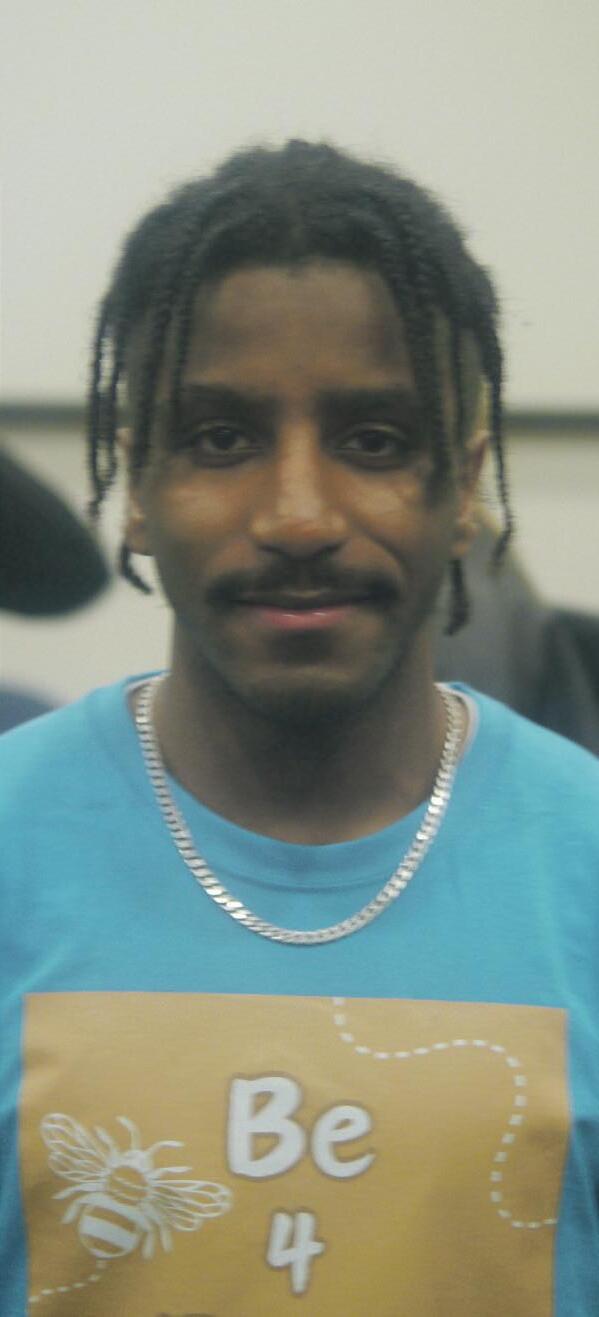
BDS Protesters Block the Book of Kells, Demand Trinity End Silence
The Trinity branch of the BDS movement protested the college’s complicity in the Israel-Palestine conflict.
formally cuts ties with Israel, or at the very least, issues a statement calling for a ceasefire.
At 12pm on February 7th, the Trinity branch of the Boycott, Divestment, Sanctions (BDS) movement protested the college’s complicity in the Israel-Palestine conflict.
Chants such as “from the river to the sea, Palestine will be free” echoed through the front square and beyond.
The protest began in front square with the intention of gaining notice and traction from students, tourists, and college management alike. Roughly 30 minutes into the protest, the group made their way to the Book of Kells Experience in the hopes of blocking tourists. They were successful. Management started diverting tourists through another entrance, however the protesters were quick to split up to barricade all the ways in. With approximately 30 protesters in attendance, equipped with speakers, chants, posters and lots of energy, the crowd garnered a lot of people’s attention.
The motivation for the protest was to demand action from Trinity, asking that the college
When the Russia-Ukraine war started, Trinity was quick to cut ties with Russia. This included sanctions, protests, and barring students from studying abroad in Russia. According to the protesters, this shows that Trinity is making a conscious decision to do nothing in the case of Palestine. Trinity College Dublin Students’ Union (TCDSU)
President László Molnárfi explained that these protesters are showing students are “no longer accepting College’s silence”. For Trinity, “it comes down to money, and it comes down to corporate interest. It is all about the bottom line and profit margins”, according to Molnárfi.
However, the protesters present had hope. The University of Galway recently released a statement condemning Israel.
While Trinity has yet to do the same, change across Ireland is clearly on the way. Protester Hamza Bana, the Union’s Ethnic Minorities Officer and a Welfare candidate for the upcoming sabbatical officer elections, describes that BDS’s impact is still gaining traction and momentum. Sooner or later, College will likely have to listen because the students show no signs of stopping anytime soon. The pressure is on.

The University Times Monday 26 February, 2024 ` 9 NEWS
EDITOR
Alex Payne ASSISTANT
Reyes CONTRIBUTING WRITER
Isabella
referendum concerning the Gaeilge Initiative has passed with a 90 per cent majority, successfully voting to create a full-time Sabbatical position for an Irish Language Officer. The referendum saw a turnout of 1,590 voters, the highest turnout in any Trinity College Dublin Students’ Union (TCDSU) referendum since 2018. Of these, 1,424 voted in favour of the motion, 162 voted against and 4 ballots were spoiled.
current part-time Oifigeach na Gaeilge, Pádraig Mac Brádaigh, first proposed the motion on the third Student Union Council of the 2023/24 year. It was seconded by Trinity College Student Union (TCDSU) President László Molnárfi. The motion had a stipulation that a €4.00 charge would be applied to the Student Levy. However, “students deemed to be in financial hardship, as moderated by the Senior Tutor’s Office, would be exempt from payment of the Levy Fee”. The funds will be distributed such that TCDSU is expected to receive up to 70 per cent of the funds, with the Central Society Committee receiving 15 per cent, the Sports Union receiving up to 10 per cent and Trinity Publications receiving up to 5 per centof the funds. Nominations for the position were anounced on Friday, February 9th. Pádraig Mac Brádaigh was announced as the sole candidate for the role. Should he win, he will take on a full-time Sabbatical Role for the 2024/25 academic year. Leah Downey DEPUTY NEWS EDITOR
PHOTO BY BRIDGET MCBRUISER FOR THE UNIVERSITY TIMES
PHOTO BY BRIDGET MCBRUISER FOR THE UNIVERSITY TIMES
UNIVERSITY
PHOTO BY ISABELLA REYES FOR THE
TIMES
Bakar to Headline T-Ball
The other acts set to perform at the event include Horsegiirl, Kingfishr and Black Traffic.
Phoebe Pascoe ASSISTANT EDITOR
Trinity Ents have announced the line-up for Trinity Ball, which is to take place this year on Friday, April 12th. The night will be headlined by the British singer Bakar, who is best known for his 2019 single, ‘Hell n Back’. He last performed in Dublin at The Academy on November 23rd, 2023.
The fifteen acts include Horsegiirl, Kingfishr, Black Traffic, Bricknasty and Cassö. In their post on Instagram, Ents referenced the “host of new and rising Irish artists, as well as internationally recognised acts.” Also performing are Charlotte Plank, Shee, The Cope, Moio, Bruising Shins, as well as Trinity’s own Trad Soc and Raw Cuts after students voted on an act from College to play on the night. While the announcement included DUDJ and Trinity Orchestra, the Trinitones were notably absent from the list of acts.
The theme of this year’s event is ‘renaissance’. Last year’s T-Ball welcomed Two Door Cinema Club to Front Square for a ‘back to the
90s’ themed night. The ball is often called the largest private party in Europe, with former headliners including Tinie Tempah, Calvin Harris and The Smiths.
Despite fears that this year’s T-Ball would not go ahead on campus, Ents confirmed in January that the night will be held at College, as in prior years.
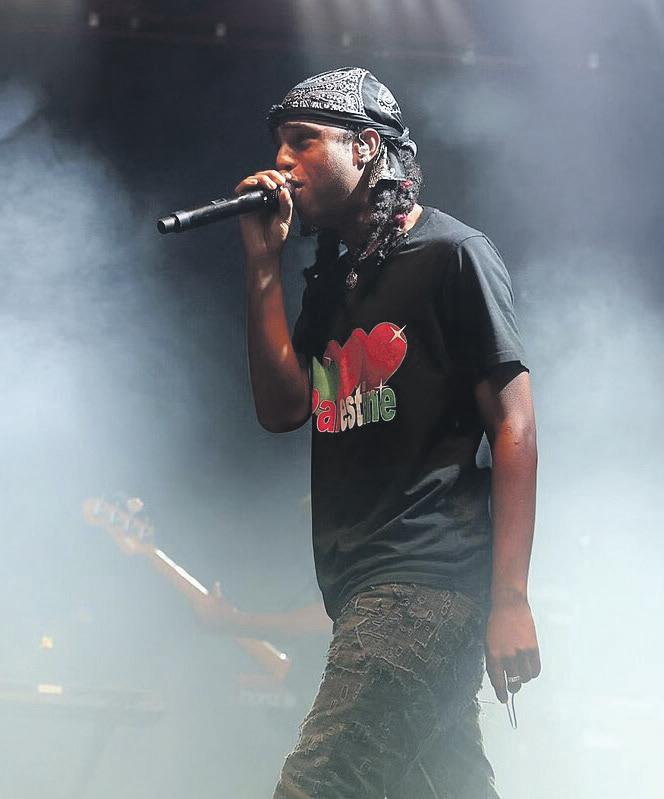
Renters’ Solidarity Network to Take Trinity to the RTB
The group has also announced their plans to escalate this action against the college.
It is on the basis of these concerns that the Network intends to lodge individual disputes to the RTB. Explaining its decision to bring disputes before the board, the group explains, “this avenue of putting pressure on College was decided following consultation with Threshold,” an organisation providing free advice to support renters in Ireland. The Renters’ Solidarity Network has also outlined its plans to publish a survey recording instances where issues have surfaced regarding the policy on overnight guests. The statement also posited the group’s intentions to escalate by taking direct action against College authorities, details of which can be expected in the coming weeks.
Earlier this year, the TCD Renters’
Solidarity Network also started a petition demanding that College abolish its overnight guests policy. The petition, which has amassed over 540 signatures, criticises the “overpriced and dingy” Trinity student accommodation, specifically citing its “terrible WiFi, frequently malfunctioning utilities and an almost nonexistent maintenance system”. Through the petition, the group also condemns the “arbitrary limitations” placed on residents’ “autonomy and personal lives”.
In a statement to The University Times, a university spokesperson acknowledged that “the RTB serves an important function for accommodation in Ireland”. The statement continues, stating that “any queries received from an independent public body are dealt with appropriately”.
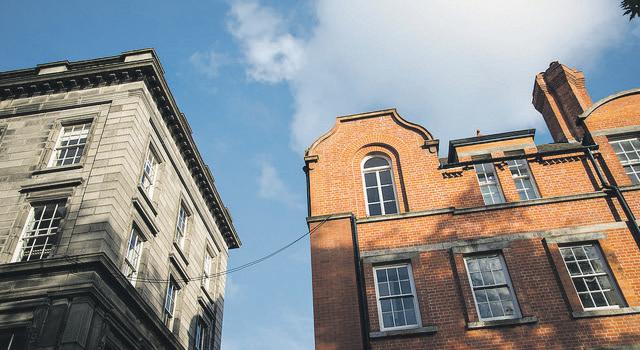
Trinity Green Campus to Host Green Week Sculpture Contest
The competition will showcase up to 20 upcycled sculptures.
As part of Trinity College’s Green Week, the Trinity Green Campus Committee (TGCC) is organising a “Sustainable Sculpture” competition.
From March 11th to March 21st, the competition will showcase up to 20 upcycled sculptures created by artists across Ireland. The competition is open to artists of all levels who can work in a medium that can withstand being outdoors on Trinity’s campus for two weeks.
“The aim is to catch the passerby with various creations in artistic forms and to stop and make them think about sustainability in their own lives”, said Trevor Woods, a TGCC member who is organising the event. The committee hopes that the exhibition will inspire tourists and students to change their outlook and actions on sustainability.
Trinity Green Campus Committee is a group of students, staff and alumni who meet monthly to improve sustainability in the Trinity community. In the past, the Committee has organised the
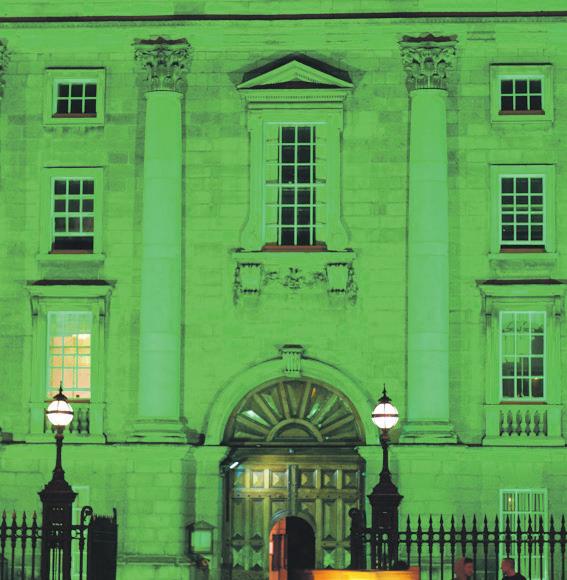
TCDSU Occupy Department of Further and Higher Education
They demanded increased student supports.
Leah Downey DEPUTY NEWS EDITOR
On Thursday, February 15th at 11.11am, the Trinity College Dublin Students’ Union (TCDSU) marched from the Dining Hall to the Department of Further and Higher Education to demand “a long-term solution to the student living crisis”. The Students’ Union demanded that college counselling services meet the recommended ratio of 1000:1 counsellors to students, and ordered permanent state investment on this front. The Union further demanded the government to deliver the €307 million annual shortfall in core funding of
universities.
Other demands included the abolition of tuition fees, the seizure of vacant properties, the restoration of the eviction ban and the implementation of rent controls. The Union also expressed a desire to democratise the university and bring it under student and staff control, and to end precarious employment in universities for both academics and postgraduates.
Speaking to the students present, TCDSU President Lászlo Molnárfi said that no change has happened since the National Student Walkout in 2022. He stated: “All we have received from Simon Harris is smoke and mirrors.”
“No amount of lobbying will actually deliver us the changes that we want to see in funding”, he continued. “We must fight back… this
government has done our communities undeniable harm.”
TCDSU Gender Equality Officer Anna Kollár corroborated Molnárfi’s complaints, stating: “Enough of college bureaucracy. Enough of Simon Harris. Enough of Leo Varadkar.”
A representative from the Trinity branch of the Postgraduate Workers’ Union (PWO) echoed the Union’s demands of “free and affordable education for all”.
Molnárfi led the crowd in chants including “student rights, workers’ rights, same struggle, same fight” and “Leo, Leo, we want degrees, open access and all for free”.
The group then occupied the Department of Further and Higher Education, at which point the Gardaí were called and removed the protestors from the building.
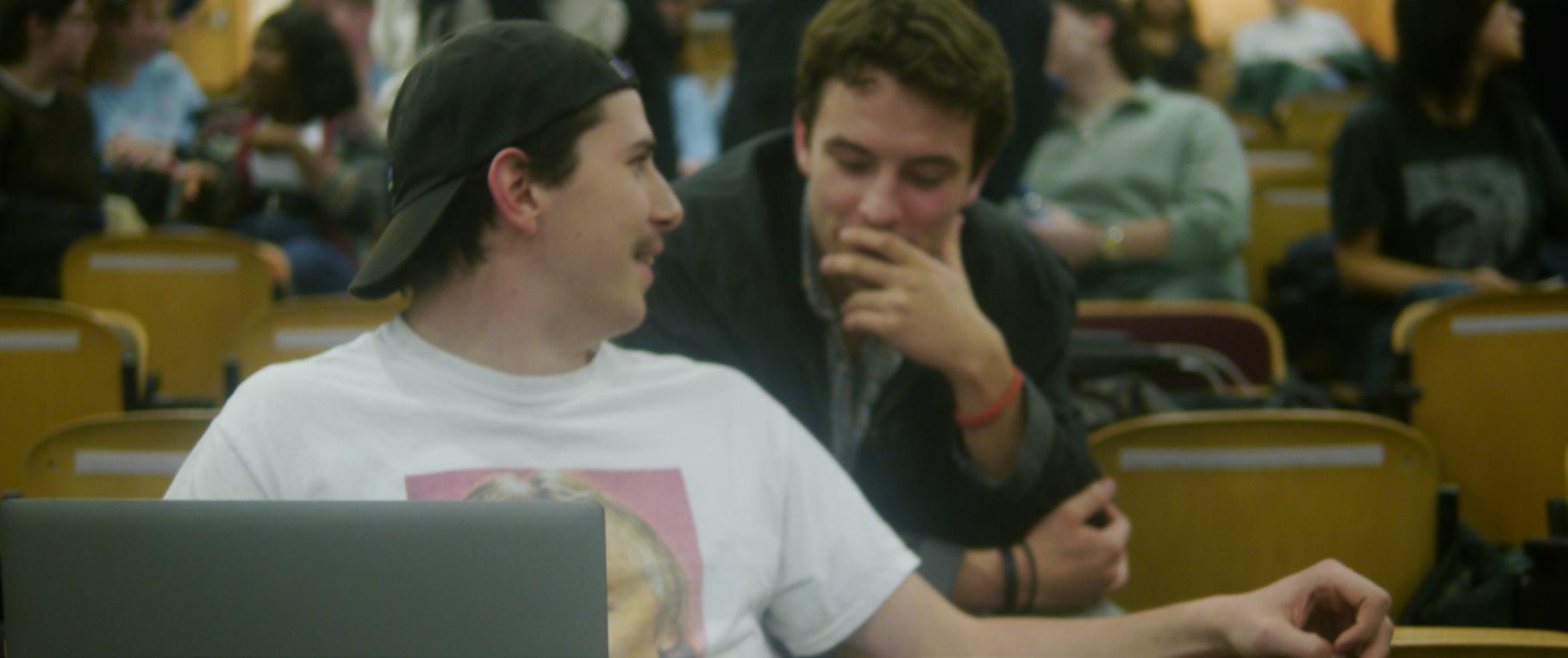
10 The University Times Monday 26 February, 2024 NEWS
For comprehensive analysis of our poll results and in-depth interviews with each candidate contesting the TCDSU sabbatical elections, read our Election Supplement, inside » PHOTO BY BRIDGET MC BRUISER FOR THE UNIVERSITY TIMES
TCDSU Sabbatical Elections
Trash to Treasure donation drive, tree planting for Climate and Biodiversity Action Week, small group discussions about climate change called Climate Cafés, and the annual Green Week.
24th,
away
birch tree seedlings to launch Trinity’s Sustainability Strategy, which
to reduce greenhouse gas emissions by 51% by 20230 and reach net zero emissions
2040. The
focus on different areas
green labs, waste reduction
biodiversity.
On January
the TGCC gave
100
aims
by
Committee hosts monthly meetings on Tuesdays that
including
and
Sophia Peyser CONTRIBUTING WRITER
Clara Roche EDITOR
TCD Renters’ Solidarity Network has announced their intention to take College to the Residential Tenancies Board (RTB) over its treatment of student tenants on-campus and in Halls.
an email sent to The University Times on Sunday afternoon, the group outlined its concerns, arguing that “the terms and conditions of the contract are unreasonable and unfair”. In the statement, they also restate their concerns over College’s overnight guests policy, deeming it “paternalistic, dangerous and hypocritical”.
The
In
Ireland Looks Set to Shape the Future of Family
Ella Sexton addresses the proposed amendments to the constitution regarding family and gender rights, marking a pivotal moment in the nation’s social and legal landscape.
Ella Sexton DEPUTY FEATURES EDITOR
On the 8th of March 2024, two referendums will be held nationwide, being the first since abortion was legalised back in 2018. This will mark the 39th Amendment of the Constitution and concerns Article 41 regarding the woman’s place in the home, and the definition of family. Article 41.1.1 of the Constitution currently states that, “the State recognises the Family as the primary and fundamental unit group of Society, and as a moral institution possessing inalienable and imprescriptable rights, antecedent and superior to all positive law.” The proposal for this is to include more text into the Constitution, changing it from its existing form to additionally state, “The State recognises the Family, whether founded on marriage or on other durable relationships…” with the rest staying the same. As for Article 41.3.1 which asserts that, “the State pledges itself to guard with special care the institution of Marriage, on which the Family is founded, and to protect it against attack”, it has been forward to delete the following text: “on which the Family is founded”, from the Article. As imagined, there has been quite a bit of discourse amongst people on either side of the argument, putting forward different views not only about which side we should be voting for
but, also, if this referendum is even necessary. As a writer, I know that talking about this can be somewhat controversial, hence why I will not be sharing where my views lie on the matter. However, I think it’s crucial that everyone becomes informed if they are not already and educates themselves on the information that is available from different sources. This article serves to merely showcase the importance of the topic at hand.
Let us start with unpacking how the idea of women in the home plays into these Articles, as they are not explicitly mentioned in either, yet are referenced in arguments for a ‘Yes’ vote. If we look at Article 41.2 it, “effectively states that women working in the home are central to the good functioning of the State and society. It also pledges to ‘endeavour’ to support women working at home so that they are not obliged to go out to work and neglect family duties” (Downing, J., 2024. Irish Independent) Yes, this is separate to the exact parts of the Article that the referendum is about, but it is hard to overlook something that is still within the same section. Not to mention, the sections of Article 41 themselves possess a slight ideology about what families are like. Even without explicitly saying something like ‘women should be in the home and never work,’ it is implicitly arguing that this is an expectation, especially when it is considered that the Constitution was made in 1937, when the Catholic Church had a heavy involvement in law-making.
If we were to look Article 41.1.1, one could say that there is no mention of what a family consists of, but with the lack of acknowledgement of LGBTQIA+ groups in laws and the Constitution, along with the fact that gay marriage was only legalised in November 2015, there is still an underlying view of a ‘family unit’ being made up of a husband and wife, with children that have both of their genes. So, the fact they have not defined what a Family is in the
for it. There are also outdated associations to this law – like being so heavily influenced by the Catholic Church – which is that the original provision “typecast[ed] women and played into things like the ‘marriage ban,’ which forced women out of public sector work the minute they married” (Downing, J., 2024. Irish Independent). This is quite a valid reason supporters of the proposed changes would want that as the current representation within the Con-
“If we can break down how the constitution views family, it makes it more inclusive to samesex parents, parents of adopted children, and anyone who is not part of a ‘conventional’ family.”
first place, apart from stating that it is a “primary and fundamental” part of society, is causing even more confusion because people don’t even know how their vote is going to affect something that hasn’t even got a definition. Those campaigning for a ‘Yes’ vote are saying that this sort of pressure being placed on the woman in the home, is now going to be redirected so that the law will show gratitude and protection for not just mothers, but also carers, who play a very crucial role in Irish society and have not received the recognition
stitution has that sense of oppression – even if some say that it hasn’t stopped women from working in more recent years. Regarding those who plan to vote ‘No’ in the election, as mentioned by The Irish Times, “The ICCL said the proposed amendment ‘will not provide meaningful legal protection’ to those who give or receive care,” (Horgan-Jones, J., 2024. The Irish Times) due to the fact that some text of the Article is being removed and, again, the additions which are due to be made are not giving
the definitions that the population are asking for. There is also a new concern that the government will have a lot more responsibility and a legal obligation to support said ‘care.’ Michael McDowell, who is an advocate for the ‘No’ vote, has mentioned that, “this change is a recipe for legal chaos with implications for things including succession and immigration law” (Downing, J., 2024. Irish Independent). There are also people arguing about the referendum taking place on International Women’s day, which they believe is already pushing the narrative that people need to vote ‘Yes, Yes,’ but Leo Varadkar acknowledged that the only reason for doing so, was to “reinforce the fact that Ireland is a modern, inclusive nation.” (Moore, A., 2023. BBC News).
To get an insight into one of the most active groups regarding this election that have been advocating for change, I contacted a member of the National Women’s Council of Ireland to get some more detail into why they are voting ‘Yes, Yes’ in the referendum. The response I received was that, “these referendums represent a turning point for our country in that we can finally give equality to all Ireland’s children that were born outside of marriage and we can recognise the enormous contribution that care makes to our society, recognising the family care of women and men today and in the future.” This conveys to the idea that if we can break down how the constitution views family, it makes it more inclusive to maybe same-sex
parents, parents of adopted children, and anyone who is not part of a ‘conventional’ family, even if it takes time for this to be seen as the new normal. Continuing this, she says “Bunreacht na hÉireann, our Constitution, is a statement of our values as a country and society. Voting ‘Yes, Yes’ in these referendums is our chance to update the Constitution, bring it in line with the lives of families, women and people today, and give direction to the future.” What we can take from this is that if there is a majority ‘Yes’ vote, marriage and “other durable relationships” will be protected by the State, The Family would not be defined by sex, and there would be a greater acknowledgment of non-biologically related carers. On the flip side, a ‘No’ vote would mean that Constitution status would only be given to two partners that are married, and marriage would be protected by the State – in other words, the Constitution would remain as it is currently. Although there are some complexities with both sides of the referendum, the main takeaway is that people are very passionate about issues related to their home life, whether it benefits or dwindles them. Regardless of whether you vote ‘Yes’ or ‘No’, get out and vote at your assigned polling station. To quote Catherine Cox, the head of policy with Family Carers Ireland: “it’s a healthy discussion” (Horgan-Jones, J., 2024. The Irish Times) that we’re having, and we can definitely take away some important points from it for the future of the Constitution.
Lisbon: Insights from an American Expat on the City’s Allure
Wynslow Wilmot talks to Marcy Pettitt, an American expat living in Lisbon, about the city’s climate, cost of living and cultural diversity.
Wynslow Wilmot
The appeal of Portugal, particularly Lisbon, for expatriates has been steadily growing in recent years, with individuals from various corners of the globe flocking to its shores in search of a new beginning. According to the Portuguese Instituto Nacional de Estatísticas’ 2023 Statistics Report, more than 1 million foreign nationals have made Portugal their second
residency. With a total population of around 10.4 million people, this means that foreign nationals make up nearly 10% of the total population of Portugal. I sat down with American expat Marcy Pettitt to explore why Portugal has become one of the most popular choices for those looking to explore life in a new place.
For Marcy, the decision to move to Lisbon was informed by a multitude of factors, ranging from climate and cost of living to language accessibility and the vibrant expat community.
“When exploring different places to move from the United States, there were several factors which informed

my decision: weather, cost of living, language, other expats in the area, ability to purchase a home, locality to the ocean, visa accessibility, and food.”, she explained, “Lisbon’s mild weather, reminiscent of Los Angeles, coupled with its relatively affordable cost of living compared to major American cities like Los Angeles, makes it an attractive destination.”
Moreover, the city’s multicultural environment and abundance of international cuisine cater to diverse tastes, “The food scene in Lisbon is world class. While the traditional food of Lisbon, often based around fish, is amazing, because of the diverse citizenry, and history of Portugal, the abundance of international offerings is so attractive. From sushi to vegetarian dishes, to pork, steak or chicken, Lisbon offers it all. And then there are the desserts, one can never forget the desserts, including the world famous Pastel de Nata.”
However, the surge in expats has not been without its challenges.
Marcy notes that the increase in demand for housing has driven up prices, posing difficulties for locals and expats alike. “In speaking with locals, for example waiters at restaurants, they all complain about the high cost of housing, and how that makes it difficult to live within the City itself.” She goes on to explain, “While no one has directly come out and blamed the condition on expats, supply and demand, without some type of market intervention, sets prices. But, around the world countries have been experiencing inflation, so the increase in the cost
of housing probably cannot just be blamed on the influx of expats.”
Oftentimes one might find locals become disdainful of people moving into their cities, yet this has not been the case for Marcy, “I think that because Lisbon opens its arms, literally and figuratively to expats, it attracts expats and expats are attracted to it. It becomes a win-win for everyone.”
The friendliness and welcoming of the Portuguese people has allowed Marcy to become fully comfortable in the city, being embraced while embracing this new culture “While Portuguese is the language spoken by the locals, almost everyone has some degree of English, and the locals are not offended when Portuguese is not your first language. Lisbon is home to many expats, not just from the United States but Ireland, the UK, Australia”
For Marcy, the most rewarding aspect of living in Lisbon as an expat has been immersing herself in the culture, history, and personalities of Portugal. When reflecting upon the most rewarding aspect of her move to Portugal she said it has been, “Getting to know the culture, history and personalities of this new and lovely country.”
Lisbon’s growing expat community reflects the city’s magnetic appeal and welcoming atmosphere. While challenges such as housing affordability persist, expatriates like Marcy remain committed to embracing the opportunities and experiences that Lisbon has to offer, enriching both their own lives and the vibrant tapestry of the city.

IN FOCUS The University Times Monday 26 February, 2024 11
FEATURES
EDITOR
COMMENT & ANALYSIS
EDITORIAL: No Race Should Be Uncontested
This year, only one of the six Students’ Union sabbatical elections is uncontested. The position of Ents Officer, which normally attracts the most contenders, will be a one-horse race. By comparison, in 2022 and 2023, three candidates entered the campaign period unchallenged.
The increased competition is a welcome change. Uncontested elections lead to disengagement and low voter turnout. When students believe that the result of a race is predetermined, they are less likely to exercise their right to vote. How can the Students’ Union be considered truly democratic when the elections function merely as a formality?
Moreover, on the campaign trail, uncontested candidates run the risk of becoming complacent. The healthy competition an opponent can provide encourages accountability and preparation. The competition inherent in a contested race urges candidates to refine their platforms, engage with their constituents and defend their positions with conviction.
The culture of uncontested elections may discourage capable candidates from throwing their hats into the ring. Prior experience in the Students’ Union has come to be seen as a prerequisite for a sabbatical officer position. While an awareness of the internal workings of the Union is no doubt an advantage, those who rose through the ranks of the JCR Committee or served as the Deputy Editor of The University Times should not be considered the “heir apparent” to the sabbatical officer crown. If the Students’ Union wants to serve a student body as diverse as Trinity’s, anyone with a strong vision for a sabbatical role should be encouraged to apply.
With candidates in every race likely to field questions about increasing engagement with the Students’ Union, we must foster an environment conducive to democratic participation and diverse representation. Encouraging participation in the sabbatical elections and nurturing a culture of inclusivity, regardless of background, are crucial steps towards realising the full potential of student governance.
EDITORIAL: Trinity Must Listen To Their Academics
The Collins English Dictionary defines a university as “an institution where students study for degrees and where academic research is done”. Who carries out the academic research? The academic staff. What is a key metric by which universities are ranked (and therefore an attractive force for their primary money-makers, the students)? The quality and reach of academic research. What constituted 25 per cent of Trinity’s income in 2021-22? Academic research grants and contracts.
As the key driving force behind Trinity’s, and for that matter any university’s, commercial viability, College’s academic staff must be respected when they speak up. But it is, of course, not only their commercial value to College that must be recognised. It is only College’s blinkered approach to its status as a commercial enterprise that forces the argument to be put to them under these terms. Academics are, by definition, professional thinkers and communicators. They drive change not just in the academic arena, but also in the wider administrative, commercial and political institutions that look to them for advice. They are regularly platformed in national media for the expert opinion on a matter pertinent to the public. They are regularly employed in government roles to shape policy that reacts to shifts in societal attitudes.
On November 4th, 2023, over 70 Trinity academics signed a letter from Academics for Palestine, calling for Irish universities to sever ties with Israeli institutions. In January this year, Trinity’s Provost, Linda Doyle, refused to meet with Academics for Palestine. Trinity’s Head of Medicine, Professor Colin Doherty, wrote a personal letter to staff and students saying he “can no longer stay silent about the current catastrophe unfolding in Gaza”. College’s silence on the matter remains deafening.
Rather than prioritising, and taking advantage of, its policy to remain apolitical, Trinity must listen to its academics and recognise their value as professional thinkers and communicators, not just their value in College’s commercial aims, if they do that at all anyway.
Dublin Needs Late-Night Transport
Public transport in Dublin is dubious at the best of times, but those times need to start including the hours after midnight.
Throughout my postpandemic college experience, I have been lucky enough to visit a number of different European cities. Perhaps it is the result of general curiosity or perhaps it is indicative of the “to emigrate or not to emigrate” dilemma, but my arrival home from these trips tends to involve a review of the strengths and weaknesses I identified in the respective location. Anyone who has the misfortune of asking me about my trip receives a detailed response as to the various aspects that induced my awe or derision. Notably, my detailed response tends to both start and end with phrases along the lines of “and you should have seen the public transport!”. My inadvertent love of discussing public transport is akin to the desire of many older people to discuss cultural “wokeness”: I’ll bring it up at the first opportunity in any given context and despite a blatant lack of applicable information I’ll share my opinions with the confidence of an expert. Researchers have carried out studies determining how long the average person will spend dedicated to certain activities throughout their life. On average we will spend almost a third of our life asleep, 4.5 years eating and 1.3 years exercising. It’s easy to guess that these studies were not carried out in Dublin, because if they were there would also be a statistic to inform us of the number of hours spent waiting at a Dublin bus stop. Frankly, it’s a statistic I dread to envisage. Almost anyone who has ever taken a form of public transport in Dublin will have a delay tale they can regale. However, it’s not just about colloquial anecdotes. In 2022 the National Transport Authority (NTA), fined Dublin Bus almost €1.5 million and Go-Ahead was fined over €850,000. The company operating LUAS were hit with penalties totalling €2.67 million. These statistics provide

an overall picture of a system that is infamous for its inefficiency. But the smaller picture is made up of the thousands of commuters who are forced to rely on an inherently unreliable commute.
In Paris, Valencia or Zurich, the various public transport options allowed us to make plans based on where we wanted to go. In Dublin, if branching outside of the city centre, we make plans based on where the bus wants to go. This flaw in the infrastructure persists despite the fact that Dublin is not just a capital city, it is also a primate city. For anyone who needs a refresher on their junior cert geography terms, a primate city is defined as one that has at least twice the population of the next biggest city. A disparate level of the economic, cultural and political influence of the country resides in Dublin. This is an issue in itself, and the fact that Dublin offers any possibility of a public transport route is more than can be said of many more
rural parts of the country. There is no question that we need a stronger and better connected public transport system that extends beyond Dublin, but we simultaneously need one that extends beyond midnight.
I recognise that there is a privilege in this statement. As if, at the simple suggestion that I want to get public transport home at night, all the other factors must simply fall into place at my whims. I am not naïve as to the demands this places on the service, the employees, or the increased levels of antisocial behaviour always noted in line with this debate. However, a late night public transport offering is neither a brand new concept nor an impossible task. We have watched and benefited from the late night services of other countries but most importantly, we have also watched and benefited from the temporary late night services of our own system. Throughout the busy socialising month that was December, peak weekend

nights saw limited extensions applied to the public transport system. Certain trains ran until 3am, LUAS operated a tram every fifteen minutes until 3am and Dublin Bus operated late night bus schedules. On the occasions that I took one of these routes, the services were packed. The need and desire from commuters exists, but the consistent service doesn’t. That any city, never mind a capital and primate city, needs to be functioning and well connected is without question. But extending public transport does more than support the functionality of Dublin. It supports late night workers, it supports the environment, and it supports safety. The undeniable need for a better system is visible every Friday and Saturday night when groups of students huddle together on the streets of Dublin and frantically try to refresh their cost-inducing taxi apps. Employees who support the economy with their late night work are excluded from the option of commuting from work by public transport. And despite reminders of the environmental benefit of choosing a bus or a LUAS, our transport infrastructure is designed in a manner that perpetuates a reliance on private cars.
For all that I argue for a late night public transport system, I recognise it cannot happen overnight. But it can start to happen. Perhaps it starts with additional services one weekend night per week or perhaps it means extending operating hours even marginally. The longterm plan is to be able to hop onto public transport and experience a smooth and seamless journey from any place or at any time. However, if the Metro saga has taught me anything about longterm public transport plans in Ireland, perhaps sticking to smaller short-term targets will reap the greatest benefits to start. In the initial stages, all or nothing are not the only options that will provide benefit. Public transport in Dublin is dubious at the best of times, but those times need to start including the hours after midnight.
12 The University Times Monday 26 February, 2024
Sophie Coffey OPINION EDITOR
Why Libraries are the Best Places
Dr Becky Long advocates for the importance of reading, regardless of what or where, for the personal growth it fosters.
Dr Becky Long COLUMNIST
Depending on when you get your hands on this
both wary and kind. To rely on other people – but not too much because they’re always capable of letting you down, even if they don’t mean to … and to try and understand them when they do.
every day of the year, and I’m no different.
Why do books matter in this day and age? When the news is full of horrors we can’t seem to fix and our phones are pulling at our brains and our souls, and everyone is just so ridiculously busy. Well, it’s obvious, isn’t it? Books are more important now than they ever were. And so are libraries.
But before we get into that, I want to tell you a story about two books. One that I read when I was twelve years old, and one that I wish I could have read when I was twelve years old. Homecoming by Cynthia Voigt was published in 1981. It’s the story of four children, Dicey, James, Sammy, and Maybeth Tillerman, and their quest to find themselves a home. It’s not an easy book to read, no matter what age you are when you pick it up, and like all the best stories, it sticks with you. At least, it’s stuck with me, all these years later. Mostly because of Dicey, a thirteen year old girl who becomes the difference between survival and oblivion for her family, during a long summer spent walking along the highways of America’s East Coast. I’m not going to tell you the story, because I hope you’ll read it for yourself, but I will tell you this. Homecoming taught me a timeless lesson, that I have never forgotten. In fact, these days, I’m reminded of it more and more. Adults can get it wrong. Adults don’t always know how to do the right thing, or even what the right thing is. A book I read when I was twelve years old managed to teach me to be
One Hundred Percent by Karen Romano Young is the book I wish I could have read when I was twelve, but it had just as much to teach me when I was twenty-eight, which is when it was published. (I am no longer twenty-eight, but I still feel like I’m twelve on the inside, and all of a sudden, we’re back to Maths again, go figure). It’s one of those books where nothing much happens – except life. Everyday life and the ways it can change all of a sudden or little by little. Christine, the central character, is in her last year of elementary school, and nothing, not even her nickname, fits anymore. What can I say about the plot, except that I felt like Tink was a real person, one who could just as easily walk in the front door as step off the page. For someone who practically read books for a living, this story was something special, even for me. Because it felt true. This book taught me – or maybe, it reminded me, when I needed to be reminded more than I realised – that no one else is like you, no one else in the world, but that you are never alone. Because someone has always been there before you, and someone will always be coming after you.
Now, back to libraries. As a Trinity student, you have access to the biggest library in the country. (How cool is that! It is cool, don’t judge me). But don’t forget about your local library, because odds are, it’s at the heart of a lot of important things in your community. When I was younger, I thought my library was a magical place. Where else could I go and find twelve books – twelve books! – to take home, for free? All the pocket money in the world wouldn’t have fed that kind of reading habit. And there were always new books, no matter how many I checked out. There was always someone there who had a recommendation for me, always someone on the desk who had a smile for me, even though they often couldn’t see me behind the pile of books I’d chosen. And as I got older, I
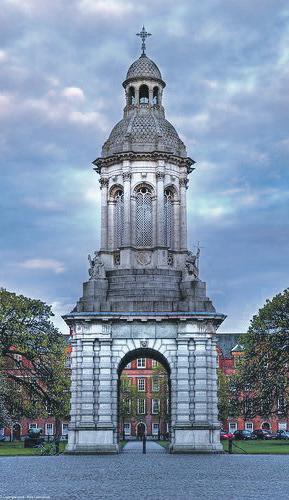
realised that I was right. If magic does exist in this world, you’ll find it in libraries.
Because books can teach you things that you can’t learn anywhere else. And I obviously don’t mean Maths and Biology. Books can teach you how to be a good human being. They can teach you to care about other human beings. Books are manuals for life. And as much as reading is a right, a fundamental human right, if you ask me, it’s also a privilege. Never take it for granted. One of my favourite lecturers, who I’m now lucky enough to call my friend, once told me that the best books ask something of their reader. You can return to the best books over and over again, even as you change, even as the world around you changes, and they will still ask something of you –but what you’ll get back in return
You can return to the best books over and over again, even as you change, even as the world around you changes, and they will still ask something of you – but what you’ll get back in return can’t possibly be quantified.
can’t possibly be quantified.
But this is the bottom line. This is the hook. It doesn’t matter what you read – and this is coming from an English Studies graduate. It doesn’t matter where you read (so long as you’re not operating heavy machinery at the time). And it certainly doesn’t matter how good you are (or think you are) at reading. All that matters is that you read. Getting lost in a book is one of the best things you can do for yourself. You never know who you might meet, or where you might end up! What you might learn, about yourself, and the world. How your entire perspective on something might change. C.S. Lewis said it best. We read to know we’re not alone. (Well, actually, it was a line in a film about C.S. Lewis but let me have this one, please. Shadowlands, you should watch it, but not without a box of tissues). And he was the genius who thought to put a wardrobe, a lion, and a witch in the same title. So, if you missed Ireland Reads, don’t panic. Find a book to read.
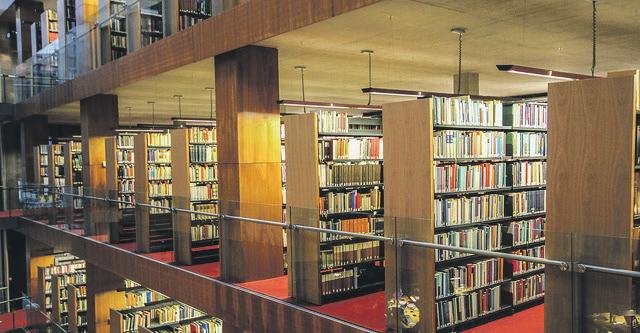
Mandela House, 6 Trinity College, College Green, Dublin 2 Phone: (01) 646 8431 Email: editor@universitytimes.ie
Clara Roche, Editor
Sáoirse Goes, Deputy Editor
Phoebe Pascoe, Assistant Editor Alexander Payne, Assistant Editor
Hosanna Boulter, News Editor
Wynslow Wilmot, Features Editor
Ella Sexton, Deputy Features Editor
Sophie Coffey, Opinion Editor Valentina Milne, Sports Editor Cleo Daly, Magazine Editor
Emma Fitzpatrick, Magazine Editor Sajal Singh, Deputy Magazine Editor
Ellen Duggan, Assistant Magazine Editor Barrett Ellis, Radius Editor
Ella Hussey, Radius Editor
Maisie Greener, Assistant Radius Editor
Joshua Hernon, Political Correspondent
Charlie Hastings, Chair of the Editorial Board
Aoife Kirby, Copy Editor
Sarah McCarthy, Copy Editor
Elizabeth O’Sullivan, Copy Editor
Princess Omozusi, Creative Director Róisín Newman, Social Media Manager
Elly Christopher, Art Editor
Clara Potts, Fashion Editor
Eloise Sherrard, Deputy Fashion Editor
Hanna Valila, Assistant Fashion Editor
Sarah Murnane, Film & TV Editor
Ella Parry, Food & Drink Editor
Pearl Biggers, Deputy Food & Drink Editor
Sarah Browne, Literature Editor
Molly Wetsch, Deputy Literature Editor
Sadie Loughman, Music Editor
Eliora Abramson, Societies Editor
Corinne Mahon, Photographer
Gareth McCrystal, Photographer
Maisie Norton, Photographer
Ella O’Brien, Photographer
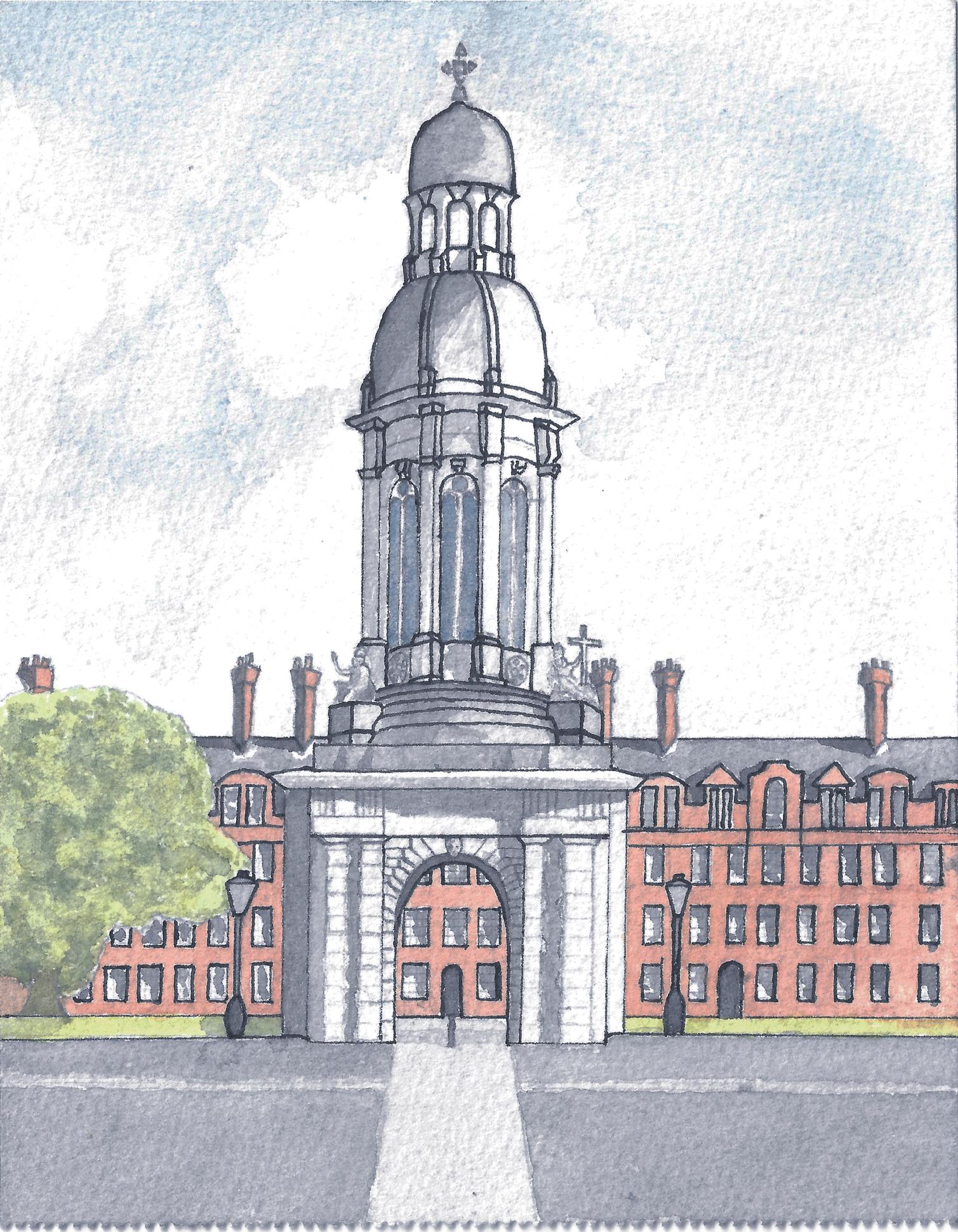
13
ANALYSIS The University Times Monday 26th February 2024
COMMENT &
paper, you
not have taken part
Ireland Reads,
national celebration of reading and of
places where reading
local libraries to schools
public transports
green spaces
… bathrooms
privacy
may or may
in
a
all the
happens – from
to
to
to
(hey, sometimes
is in short supply), you get the picture. Officially, Ireland Reads on February 24th this year, but of course, everyone behind the initiative wants the country reading
COMMENT & ANALYSIS
Resilience and Reward: Mature Students Navigating Higher Education
Amélie McGowan navigates the highs and lows of the mature student experience in conversation with Mature Students officer Ailish Smith and others.
Amelie McGowan DEPUTY OPINION EDITOR
Picture the average Trinity student. What do they look like? Was the first image that appeared in your mind a young student? Most people would answer yes.
The population of mature students is small, and rarely represented. Approximately 10 per cent of each course is composed of mature students, but this varies from course to course.
Many students enter through Trinity’s Access Programmes, or TAP, and take a foundation year, called The Foundation Course, before beginning undergraduate courses offered at Trinity. Many of these programs provide support for mature students who either come from underprivileged backgrounds or have not experienced higher education.
For Ailish Smith, the Access Programmes defined the beginning of her time in college: “If I hadn’t done the Access programmes, I would have dropped out within the first year. I wouldn’t be here today.”
The Access Programmes extend beyond their foundation year, as Ailish continues to explain, and the programmes provide support for the students throughout their four years at school.
Rather than driven by obligation or societal expectations, as most younger students are, mature students enter college on their own volition. This creates different expectations, both in and after college, which inevitably leads to different outside pressures. “For me,” Smith explains, “It’s friends and family that are like ‘what are you going to do?’, and that’s
pressure because you’re going, ‘Oh, what am I going to do?’”
“It will just be a different journey than for a younger person,” says Smith.
“In my early twenties, I didn’t care about studying all that much,” first year Valeriia Shmyrova explains, “I believe unfortunately my main goal was to have a good time, I would read sometimes just to get through the University.”
Shmyrova’s attitude has changed since returning to school: “I study really hard, and apply myself because now I understand the necessity of higher education.”
Many mature students share one thing in common - the drive to learn. It is their decision to be here, to perhaps step outside of what many might call the ‘conventional’ career arc.
Students such as John Morrissey have returned after a previous degree and lengthy career, but the fact remains the same: “The curiosity is why you’re here.”
Morrissey explains, “You sit in lectures or other things and talk outside of the class [because you want to].”
No mature student’s motivation to join college is identical to another. Some arrive with little expectation, others with every expectation. Despite this, many mature students share the anxiety of graduating.“I think there are a lot of opportunities out there for me, even though I’m a mature student, but you have to be realistic,”
Smith continues, “No matter what happens, I will get something out of it.”
“It will just be a different journey than for a younger person.” Says Smith. Mature students experience many of the same things that younger students do - finding friend groups, struggling in classes
and balancing home and college life. But there are barriers that are unique to mature students.
“There’s a little bit of a loss,” when it comes to communication Morrissey explains, “and I think it’s felt more acutely by the mature students because this is sort of a barrier to communication. You’re in a world where everything is so easily communicated, but it’s actually not when you’re a mature student.”
Social media is a pivotal platform of contact for younger students, a communication style that mature students are often left out of. “I find the social interaction very good, but it’s kind of despite the technology, rather than because of the technology,” continues Morrissey.
Similarly, technology, combined with administrative truancy, creates other barriers on platforms such as Blackboard and Trinity’s website.
“I had an absolute administrative nightmare for the first term last year.” Morrissey says, “I didn’t even know I was in tutorial groups for five or six weeks, subjects didn’t come up, emails didn’t come for weeks.”
Technology is not the only thing making mature students feel separated. “For a lot of mature students, they find that it’s very hard being in a lecture room and you’re the only mature one,” says Smith, “when you’re dealing with 18 and 19 year olds, they’re coming in with the expectation of being around other young people. So I’m imagining when they see an older person, they’re like, ‘What are they doing here?’”
Relationships between younger and older generations are not all bad, according to most mature students. “It’s actually given me greater respect for younger people being here. It’s made me
see even my own children in a different light,” Smith enthuses. After joining the Student Union, Smith has found a community of younger students. “You work with younger people all the time, and you see how passionate they are. They really care about all students no matter what their age or where they come from.”
But there is refuge, as many have found, in spaces such as the Mature Student Society.
“You have somewhere to go,” says Smith “You have somebody to talk to.” Mature students can share their particular issues with those who understand them, over a cup of coffee. “You have people who are all from different backgrounds, but we all have one thing in common; we’re all mature students.”
Shmyrova echoes the same sentiment; “There is a place where we can share our problems and complain. They can understand.”
“There is definitely a sense of community among other mature students,” writes first year student Leanne Dennis.
The aftertaste of Trinity is positive for most mature students. “It’s been a very positive experience, it’s meeting exactly what I wanted it to do,” Says Morrissey.
“I just really enjoy being here,” agrees Smith, “Every day is a learning experience.”
For both Smith and Dennis, coming to Trinity has been a confidence-boosting experience. “It helps you grow in confidence and you realize ‘I have these abilities that I didn’t think I had,’” Smith argues. “I’ve had the time to realize this is exactly what I want to be doing,” says Dennis. For current and future mature students, “Avail of every service available. Raise your hand for help. Allow yourself to enjoy it,” advises Smith.
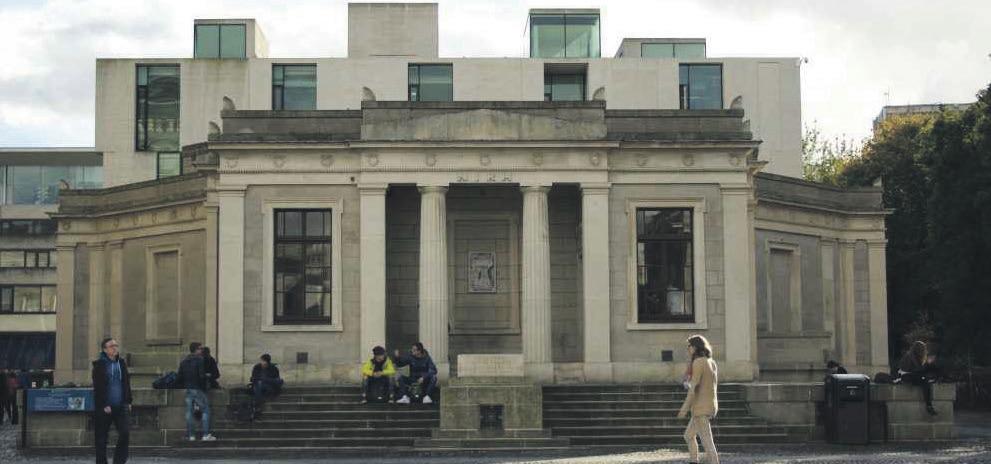
Trinity strives for international student excellence but fails to support them
Three international students write this letter with distress and regret over their chosen university thousands of miles from home, studying in a community that promised robust institutional support.
Elizabeth Rymut, Fangfei Zhang and Anna Perdue CONTRIBUTING WRITERS
or
FThree international students write this letter with distress, disappointment and perhaps regret, over their chosen university thousands of miles from home, studying in a community that promised robust institutional support.
Trinity actively recruits international students with the promise that they are committed to equality and diversity, however, their actions show that they are more than happy to use international students for their advertising and then leave them in the dust after they are enrolled.
Inside and outside of the classroom, we have seen barriers in place that prohibit a functioning learning environment and full participation of all students. Not to mention, facing mandatory,
financial obligations that are not prior disclosed in the application process which further adds a burden on top of the higher tuition fees that international students must pay.
Specifically, for the postgraduate environmental science programme, we are required to participate in a study abroad field trip. Attendance is mandatory and those who do not attend will fail the course. At the beginning of the semester, a professor informed us that last year there was an option for students to remain in Dublin and still complete module requirements, however, this has since been withdrawn. These
decisions appeared to be made without student feedback. The field trip itself is over a thousand euros, already an extreme amount for students to cough up on top of their fees. This does not include fees for the Visa that students without powerful passports must obtain, which is another one hundred and twenty euros. That is a base cost - other fees include booking the incredibly competitive Visa appointment, which an agent (extra cost) is likely needed for, as well as necessary documentation.
All of this is wrapped up in a lengthy, stressful process amidst attending classes and completing coursework – additionally, this
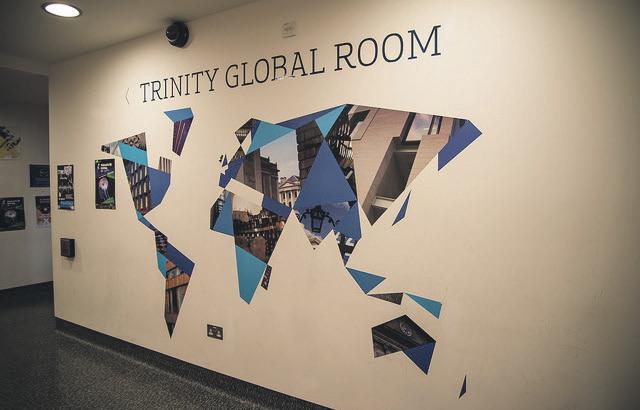
does not guarantee getting the Visa, some students may be rejected, ultimately leading to a failed module through no fault of their own. These are all costs that the student has to bear, with no financial support from the university – something incredibly problematic for students who took out loans or may otherwise struggle financially.
The Global Room, an organisation designated for international students, offers minimal services limited to Instagram posts, pizza nights, and speed friending – we’d rather see substantial support that ensures our excellent experience, including financial aid for academic expenses (like the Visa applications) and student guidance on career and future planning, like obtaining residency after graduation.
This does not include the many issues that need to be addressed including lack of communication with job limitations, no resources for students unable to find housing – so students like one of us don’t have to commute four hours every day to classes – and in-class accommodations for students who are non-native English speakers. We expected communication and guidance at the bare
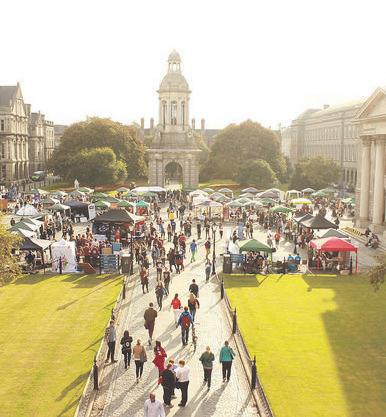
minimum from a school that advertises itself as the 16th most international in the world. Instead, throughout our studies, we have seen disorganisation, a lack of communication and resources and have been forced to rely on
the knowledge of our classmates in place of the administration.
In other words, Trinity has more than shown where their true values lie – using students for diversity points and then abandoning them without a care.
14 The University Times Monday 26 February, 2024
a campus that boasts of providing an excellent international student experience, Trinity does remarkably little to offer a hand, let alone a second glance.
The Economy Relies on Student Jobs but Refuses to Recognise Them
Regardless of the role and the company, there is a basic level of respect everyone is entitled to, writes Sophie Coffey.
Sophie Coffey OPINION EDITOR
For most students, holding down a job while in college is standard practice. Statistics show that almost two thirds of students will undertake part-time work while enrolled on a fulltime college course. The number of students in employment is more apparent in some industries than others and most of the parttime work we engage in falls into customer-facing roles including those in retail, hospitality and other services.
As a result, certain jobs are often referred to as being “student jobs”. This descriptor may have begun as a label grounded in logical data, but it has developed into a societal conceptualisation that can be defined in a far more derogatory
way. The label of a student jobs is a categorisation that encapsulates many of the assumptions and connotations of the work undertaken by young adults and minimum wage employees. At the end of the day, it is irrelevant whether someone is a director in a big four company or if they are on day four in a new company. Regardless of the role and the company, there is a basic level of respect everyone is entitled to and our increasingly efficient and fast-paced society seems to be losing this respect. Perhaps this is in part as a result of the commercialisation aspect of our societies; the idea in which paying for something translates into having a right to it. And this makes sense in the legal concept that relies on balancing our transactions. But the dynamics and entitlements of customer services transactions are not simply theoretical and legal dealings.
The right to human decency within a transaction is more nuanced. Regardless of what the pay is, regardless of the power dynamic, the right to respect should not be up for debate. Under an economic lens, it is rational to place wages on a scale and impose a minimum point. However, the minimum wage does not exist to justify treating someone with less respect because their payslip has less digits.
Our wages may be on the lower end of the scale but this incurs no right for the level of courtesy earned to be equated to that same scale. The customer is not always right but neither is the customer always polite. When we are cursed at, scoffed at and snapped at, I wonder what they would do if we responded in kind. What would the outcome be if my customer service voice was replaced with the passive aggressive (or sometimes truly aggressive) anger spouted my way.

If the customer service sector reversed the direction of the rudeness there would be complaints, Google reviews and demands to speak to the manager. But instead we force our customer service mask to remain in place. Where they are demanding, we must remain demure. Where they are apoplectic, we must remain apologetic. Where they are outspoken, we must bite our tongue.
I am in a unique position. My sheer inability to sit still or take a break means I work two jobs. These two jobs are very different. In one I work with approximately 60 other college students and in the other I am the sole college student amongst a team of full-time or permanent employees. As with any job that entails working with the public, both roles provide me with my fair share of customer service anecdotes.
However, there are key distinctions between my experiences in each role. In one job I wear a blazer and heels, while in the other job I am most likely to be found in a staff hoodie and a nametag. This appears to be a trivial and superficial difference but it correlates with a difference in the way I am treated. The job in which I am wearing a blazer is far less likely to see my age brought into debate as a means of demeaning me and the escalation into demanding a manager is far less frequent.
By contrast when dressed in my staff hoodie I have a far greater likelihood of being spoken to with condescension, derision and

contempt. A judgement is made based on my attire and my job that sets the tone for the interaction. I am the same person regardless, but the level of automatic respect that is either withheld or granted is influenced by the environment I work in and the connotations of my role.
Those roles that are disparaged and minimised as being “just college jobs” would simply not exist without college students. The services of certain industries would flounder without college students. And yet the customer service stories my friends and I share are increasingly ridiculous.
That a place of business has the air of “being run by students” is a criticism, but it’s an ironic critique. Because those students who run it, are the exact reason it can exist. There is an almost humorous level of irony in the complaints of people who would never dream of undertaking such roles themselves. Certain sectors of
Students and staff must unite on lecture recordings
our societies consider themselves above the work of “student jobs”. It is as if graduating out of tertiary education means graduating out of a hierarchical rung of the workforce. In many ways, this echoes the disregard and disrespect faced by immigrants in various sectors of the Irish labour force.
There are an estimated 3,000 delivery workers in Ireland, of whom a significant proportion are immigrants who have arrived in Ireland internationally from South American countries like Brazil. Despite the high levels of food delivery ordered every single day in Dublin, a strike was organised by many of these drivers in order to protest their poor pay. A huge proportion of people utilise delivery services but very few of them recognise the workers who provide this service. In many ways the economy relies on students and immigrants but relying on us is not the same as recognising or respecting us.
The calls to introduce universal lecture recording have often been made without understanding the complexities therein, and thus little to no progress has taken place, writes László Molnárfi
Luniversal lecture recording have often been made without understanding the complexities therein, and thus little to no progress has taken place. Namely, at our College, there is no all-around access to lecture recordings. Ultimately, the antagonism must be dissolved through the power of student-staff solidarity.
On one hand, the student perspective is that lecture recordings are essential for equitable access to education. This is specifically the case for underrepresented groups. Working students, student parents, mature students and students with disabilities, chronic illnesses and
neurodivergence stand to benefit massively from the ability to access lectures anytime and anyplace at the touch of a button. Students with language barriers have reported benefiting from recordings, as have those with attention difficulties and this is not to mention that during a housing crisis, access to lecture recordings would be a welcome measure for students who are forced to commute for hours back-and-forth, as pointed out by the Students’ Union (TCDSU) in 2022. In general, the positives of being able to revise for exams and assessment without needing support from the lecturer are wellknown. Holistically, the approach of Universal Design for Learning (UDL), which features lecture recordings as one of its aims, is the recognition that each student is a unique learner with unique ways
in which they process information. The recognition that there is no one-size-fits-all design for learning is shared by the latest research on education, yet holistic alternatives lag behind in implementation.
On the other hand, the lecturer perspective is that lecture recordings are adverse to labour interests. As a result of universities insisting on performance rights, and the possibility of senior management running recorded lectures during strikes, unions like the Irish Federation of University Teachers (IFUT) have opposed their widespread use. The use of recordings by senior management for censorship, performance reviews and micro-management of lecturing staff has also sparked concerns, because any tool in the hands of employers can and will be used to degrade working
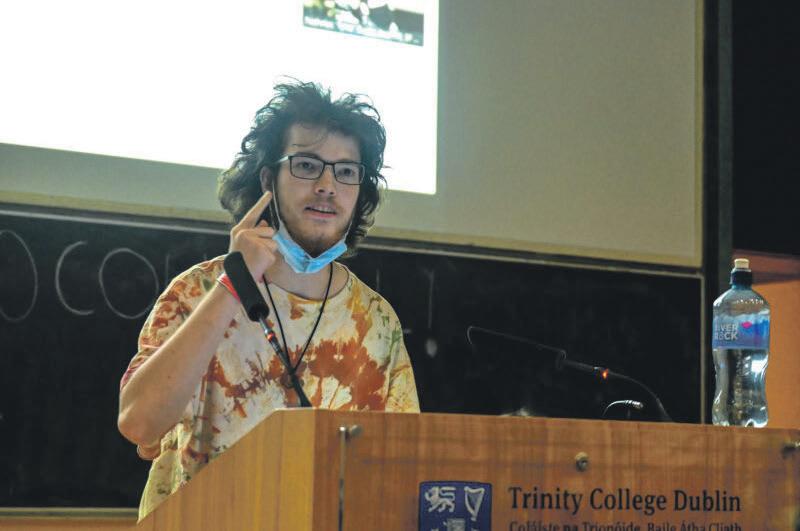
conditions and salaries. This comes as the third-level sector is under severe pressure, with 50 per cent of lecturing staff being on casualized, insecure and low-paying contracts. The interests of a trade union is to safeguard its members’ interests, and that is precisely what is being done when they advocate against lecture recordings. Lecture recording is a technology with potential for good, especially from an accessibility perspective, but has now become territorialized by capital to be a weapon in the struggle of the exploited and the exploiters.
Because of the complexity of the issue, calls for lecture recordings have emanated from a profoundly ignorant, if well-intentioned, position. The narrative revolves around the struggle of the student against the lecturer, who is deemed elitist, and a Luddite who refuses to move with the times. The hinterland of this approach is mistaking the part for the whole: the lecturer refuses to record their lecture as a result of their individual attitude, thus disadvantaging the student. Therefore, having failed to identify the root cause of the issue which lies in the fight against wage exploitation, students cannot draw the correct conclusions and forge the necessary alliances to progress the issue of lecture recordings.
As such, we must unravel what is happening. Nothing is as it appears. As with other issues we face, the forces of capital hold sway,
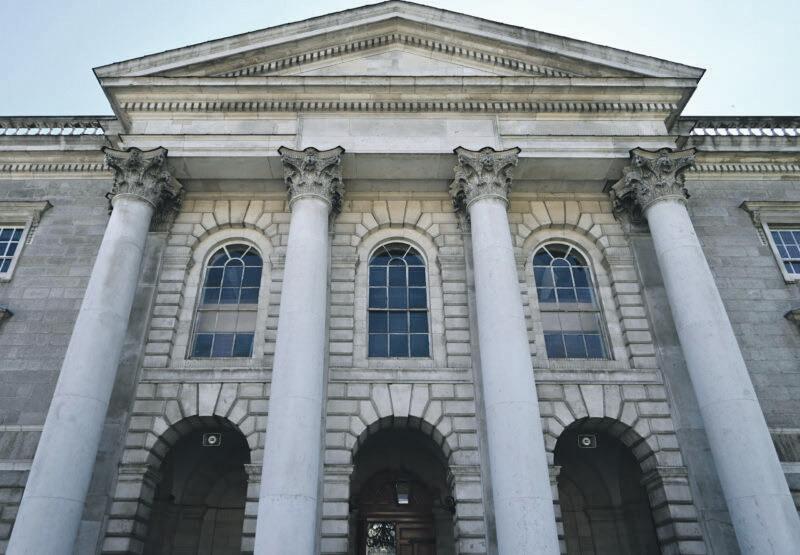
a set of hidden social relations that dictate outcomes. By linking the part to the whole we can reconcile seemingly contradictory agents into a higher synthesis. Students being pitted against their lecturers is false consciousness.
It seeks to conceal the opposing interests of the lecturer and senior management. This, in turn, is class struggle over the production process. Third-level institutions are places of production where the forces of labour and capital are in conflict, and as such suffer from the same tendency to drive down wages and boost profits that rules in wider society. This has only intensified since the 2010s through growing commercialisation.
Therefore, to overcome this impasse, students and staff must unite and fight for public, free
and fair education in solidarity with academic and professional workers in our institutions. What was once thought of as an essential antagonism between students and staff is now dissolved by uniting under the same banner and recognising senior management as the oppressive force. This will not happen instantly, but the speed of the process of moving towards the dissolution will lockstep the strength of solidarity and closeness to victory against the capitalist university. The lesson is that we need to employ holistic thinking to ease this deadlock, and have faith that by marching shoulder to shoulder with our allies in the trade unions, we can, instead of clutching at straws with no success, bring forth societal transformation for the better.
15 COMMENT & ANALYSIS The University Times Monday 26th February, 2024
technology used by lecturers to record in-person classes and then make them available via technological means to students.
our third-level institutions continue to grapple with advances in the digital age, this has invited controversy. Students are calling for lecture recordings on a basis of equity in access to education. However, teachers and teacher unions have opposed this due to concerns around higher-education institutions re-running recorded lectures to break industrial action.
calls to introduce
ecture capture is a
As
The
László Molnárfi CONTRIBUTING WRITER
Trinity Host ‘Women in Sport’ Campaign, Demand Change
On February 7th, a star-studded panel, including Director of Sport Michelle Tanner, took to the floor to demand the change needed to reduce the inequalities faced by women in sport.
Valentina Milne, Sports Editor Flossy Whittow, Contributor
Sport Ireland’s Women in Sport campaign was inaugurated last Wednesday with a panel discussion that welcomed four of Ireland’s key figures in the sporting world: Moira Flahive, President of Trinity Rugby and Chair of the Equality, Diversity and Inclusivity Committee of The Bar of Ireland; former Olympic finalist and Manager of the Women in Sport Campaign, Hannah Craig; Cricket Ireland Women’s international team member and Trinity Sport Scholarship student, Leah Paul and Trinity Women’s Football coach Cameron Molloy Moule.
The evening kicked off with an engaging introduction from Michelle Tanner, Director of Sport who reflected that despite the successes of past campaigns that aimed to improve the inequity between men and women in sport, there is a pressing need to establish sustainable structures, to ensure continued growth in women’s sport . This new campaign will run until 2026, with the overarching goal to encourage student participation at all levels. The lasting effects of inequality in sport are extremely evident in the mindset of society. Tanner exposed the current challenges of exposure of women’s sport, as highlighted in research by Lidl, uncovering that “59 per cent of the population would rather watch a men’s sports event on TV than attend a female sports event”, while only “nine per cent would choose to
attend a female sports event over an equivalent male sports event”. Tanner stressed that these statistics are only the surface of what the current situation is looking like and thus a need for change is imminent.
The first question to the panel was directed at Moira Flahive who gave us an insight into being a woman in a male-dominated sport. She said that her boarding school and co-ed education gave her a “fight or flight” mindset when it came to the world of sport. This enabled her to push through to the forefront of professional sport, where she could exist as a role model for further generations. Her key tag line was, “you know, if you can’t see me then you can’t be me”, as she stressed the need for more exposure of women in leadership positions to inspire younger generations. “It is incumbent upon us to step up and do it…” — it being walking into a room where you know you are going to be the only woman. Despite her call for change, she warned against the mindset that all men are the enemies. Teams are entering an “adapt or die” era, where change will happen, whether wanted or not. “Not all men are against us, there are male allies out there”, she urged. She ended by describing equality as a “twoway street”, saying that “the Sundays where the father heads off to play golf, and the mother is left behind to take the girls to ballet are over”.
Hannah Craig then also reflected on her experience as a woman in a male-dominated sport, but only realised her isolation after leaving, highlighting the scarcity of female influence in her reflections. Craig
emigrated when she was very young and was thrown into the sporting world. She took it for granted that having a performance mindset meant she just kept working. She was the “blueprint” for how female success in the sporting world would work. With no-one to follow, she had to keep finding her own solutions in order to move forward — there was a certain loneliness in onliness”, Craig said to the audience. It was only after retiring from her 20 years as a professional athlete that she felt the conversation shifting from emotional to productive. Her illuminating description of sport as a “product” was a refreshingly productive take. As soon as you realise it was designed for men, by men, to be played by men, you can appreciate that the future is about a systematic product change. Sport Ireland’s Women in Sport campaign, is set to be at the forefront of the change in this said “product”. She ended by agreeing with Moira that blame is only a hindrance to the cause: “We are past angry protest, and looking forward to real progress.”
Third panellist, Female Youth International Cricket Player of the Year, and Trinity Student, Leah Paul, was pleased to be among some of her role models for the evening, saying the likes of Hannah and Moira were making great waves in the profession. However, despite this, the issue is that there are minimal female cricketers to aspire to, and it hard to see yourself making it in the career, if you are not shown that as a viable option. A key pillar to Leah’s sporting experience is the community it fosters. She fondly discussed the
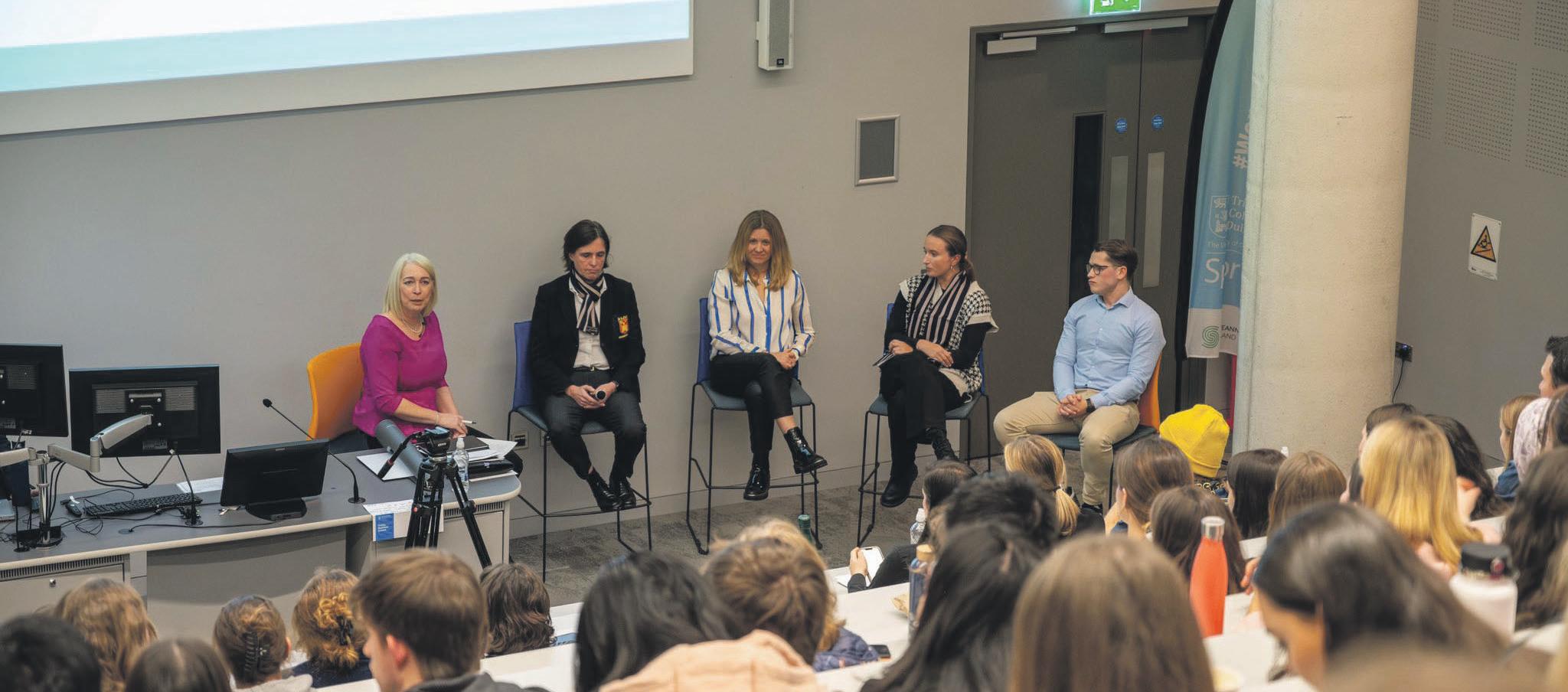
friendships you make for life. That kind of support system is essential, when leading the way, and calling for change, can be such an isolating movement. Events like these are essential in making women know they are not alone.
Finally, the newly appointed Trinity’s Women’s Football coach, Cameron, could not stress enough how excited he was to begin his new role. He is treading uncharted waters here, and his employment is a monumental step for Trinity, who had neglected the women’s team for a while. This is a very hopeful step in the right direction. His main point was looking at the future of the Women’s 1st team. He seriously emphasised the importance for high pressure training, in order to achieve high performance results. This was a feature of his training with Bohemians that he took for granted as a male player. As a female footballer, there is minimal expectation from society to take the sport
seriously, and this stigma attached is detrimental to the value the players can place on themselves. He said: “You quickly realise it’s a whole different culture, a whole different slot in culture, for what should be the same thing…” There is an idea that it’s less of an elite sport, more of a hobby for women, and this is what he seeks to change. He hopes to foster a high level mindset within the team, with high support, but also high pressure. He made the astute point that to hold his team to the best of their ability, is nothing less than a mark of respect. No accountability, or expectation will only achieve lower results. This was an incredibly exciting, and promising end to the panel discussion. The panel was an inspiring session that should figurehead some serious change in the Trinity sporting scene. However, despite this, it was not without its flaws. It was hard to ignore the little that was said about any actual, practical targets
for the campaign, or the university, that might hold the new program accountable. Raising awareness is an essential, basic step, however there are real things that need to change. The women’s football team gave a disgruntled statement after reflecting on the lack of accountability from anyone on the Union for the fact that half the season has passed without a coach for the team, in comparison to the piles of resources afforded for the men’s teams, among them coaches, kits and a manager. They also commented on the location of the discussion, which took place in the basement of the business building, with little to no advertising outside, which was a shame. Refreshed motivation is fabulous, and the speakers were both friendly and inspirational, however to avoid this being branded as a publicity stunt, The University Times waits eagerly to see some real change! This is finally a step in the right direction for Trinity in 2024.
Joe McCarthy, Liam Scales and the Gulf Between Clubs in Trinity
Caoimhin Tracey sheds light on the disparities between Trinity’s rugby and football teams, urging for equitable investment.
Tracey CONTRIBUTING WRITER

In November, The University Times reported on the pitiful resources of Trinity Women’s Football team. The article detailed the problems they have had in accessing things such as a manager and basic equipment. The article was scathing, and it inspired further investigation into the wider inequalities and differences in the standards of sports clubs in Trinity. There is inequality not only across gender but also between different sports. For example, there is a huge contrast in the standards of the clubs which represent Trinity in Ireland’s most popular professional sports – rugby and football. Rugby’s unique history in Trinity is a reflection and a legacy of the college’s colonial roots. Accounts from students of the time suggest that rugby was being played in Trinity as far back as the 1780s. Trinity’s DUFC is the oldest rugby club in the world in continuous existence, having been established in 1854 and Trinity was very much the
college of Ireland’s Protestant Ascendancy across the 18th and 19th centuries. This provides some context for the sport’s prominence in Trinity. There have been numerous more recent reminders of Trinity’s prowess in rugby. Joe McCarthy –Leinster and Irish rugby’s emerging superstar - studies Global Business at Trinity and represented DUFC. Ryan Baird has followed a similar pathway and both are current Sports Scholars. Trinity’s standing and role in Irish rugby was emphasised in how DUFC were able to take part in an open training session in College Park in November with Leinster Rugby. Stars who had just returned from the World Cup such as McCarthy and other big names like James Lowe and Josh van der Flier were amongst those on show for a gathered crowd of rugby enthusiasts. The Trinity men impressed and coped well with the standard and intensity of Leinster, as Flossy Whittow detailed in a previous edition. Although this is something for the college to be proud of and reflects well on the standard of Trinity Men’s Rugby, it is in stark contrast to the fortunes of our representatives in rugby’s rival sport, football.
Although the shameful lack of resources for the women’s team has rightfully been under the microscope, the underwhelming nature of Trinity Men’s Football goes under the radar. In the same month that the rugby team had their glamorous moment in the spotlight alongside Leinster Rugby, DUAFC Men lost 5-0 to UCD in the CUFL Premier Division Final. It was an achievement for the Trinity men to get there, and
a reward for their dedication and hard-work. However, the game illustrated the gulf in class between two of Ireland’s leading colleges when it comes to football. UCD are able to field a team of players who regularly compete in the League of Ireland, whereas Trinity play in the fourth tier of the predominantly amateur Leinster Senior League - which is of a significantly lower standard. Ultimately they were unable to match the more well-oiled, well-equipped outfit of UCD. It is worth looking at UCD as an example of what college football should look like. UCD A.F.C.
make other colleges reflect.
More recently, Trinity managed to outperform UCD in February’s Collingwood Cup - the most prestigious competition in Irish Men’s Universities Football. UCD have won the tournament an astounding 49 times and were the holder’s going into February’s showpiece tournament. However, they fell to the University of Limerick at the semi-final hurdle in a surprise result. Trinity again performed particularly well and made another final. They defeated the University of Galway (4-1) - on their home patch - and Maynooth
“Rugby’s unique history in Trinity is a reflection and a legacy of the city’s colonial roots...”
runs an impressive scholarship system which allows players to study while pursuing their dream of making it at the elite level of football. Their work has borne fruit in recent years, particularly with the spectacular rise of Liam Scales. Scales studied Irish and Geography in UCD from 2016 to 2019 while beginning his football career – which has seen him reach the remarkable heights of six appearances for Celtic in the UEFA Champions League alongside three caps for the Republic of Ireland. His success has undoubtedly made many in UCD proud, but it is also the kind of success that should
University (3-3 at full-time, 5-4 on penalties) on their way to a showdown against UCD’s conqueror UL. Unfortunately, the men in black and red came up short in the final again. They worked hard and showed plenty of desire but struggled to create chances. They also struggled with UL’s quality in possession and suffered another 5 - 0 rout. There is no doubt that it was another difficult day for Trinity, and a reminder of the improvements that could be made at DUAFC. However, it is also a commendable achievement to have reached two major college finals in the same season. This is the kind of
performance that should be built on and rewarded. Football in Trinity should have immense potential, with the club’s incredible location in College Park and a large student body. Anyone who has been involved in DUAFC will know that the players, coaches and committee who run the club are dedicated and have a passion for the club. The club has history - with it being the oldest surviving football club in the Republic of Ireland, having been established in 1883. However, there is certainly a lack of recognition and respect for the football club compared to other sports clubs in Trinity. This lack of respect is seen in where they train and play their matches. As the rugby team were training with Leinster on that November evening, the college footballers were training on the other pitch across College Park. They were training in darkness without flood lights, on a patch of grass in front of the Pav. This is in stark contrast to the rugby pitch, which is clearly marked out by barriers, floodlights and the prominent AIB advertising - which make it appear rather glamorous compared to the football facilities. Added to this, football training and matches are often moved away from College Park to grounds in Crumlin and Santry, which are 6 km and 9 km away from campus respectively. There is also little promotion of the club on social media and matches tend to be very low-key affairs. These things together combine to make the club seem almost invisible at times.
Why should this be accepted?
Trinity has a diverse international
student body in the centre of a multicultural city - and it is no secret that football is (by a distance) the world’s most popular sport. Even within Ireland, a recent Sport Ireland’s Children’s Sport Participation and Physical Activity Study showed that football is still far more popular than rugby amongst Irish teenage boys. Dublin is the centre of Irish football and if you walk around campus or into the gym in the Sports Centre you are more likely to see a football jersey than a rugby equivalent. The University Times believes that the football club should receive equal respect and support from the likes of alumni and sponsorship. The college and Trinity Sports Union undoubtedly have a role to play in this with improving the club’s facilities, promoting the club and helping it to attract sponsors. There is surely a duty to aid in improving small clubs in the college that have clear potential.
The Sports Union has provided direct funding of €5500 through a grant to DUAFC this year. An increase on this should be considered. DUFC received €4500 this year, but the football club needs more as it receives far less in external funding than other clubs such as DUFC. Most importantly, it falls short of colleges such as UCD in terms of investment and the overall standard of the football club. This is not just about the prestige of having a Joe McCarthy or a Liam Scales associated with your club and with your college. It is also about providing for what the average student wants – whether they are a viewer, a recreational player or a potential professional athlete.
16 SPORT The University Times Monday 26 February, 2024
Caoimhin
PHOTO VIA @TRINITYSPORT ON X









































